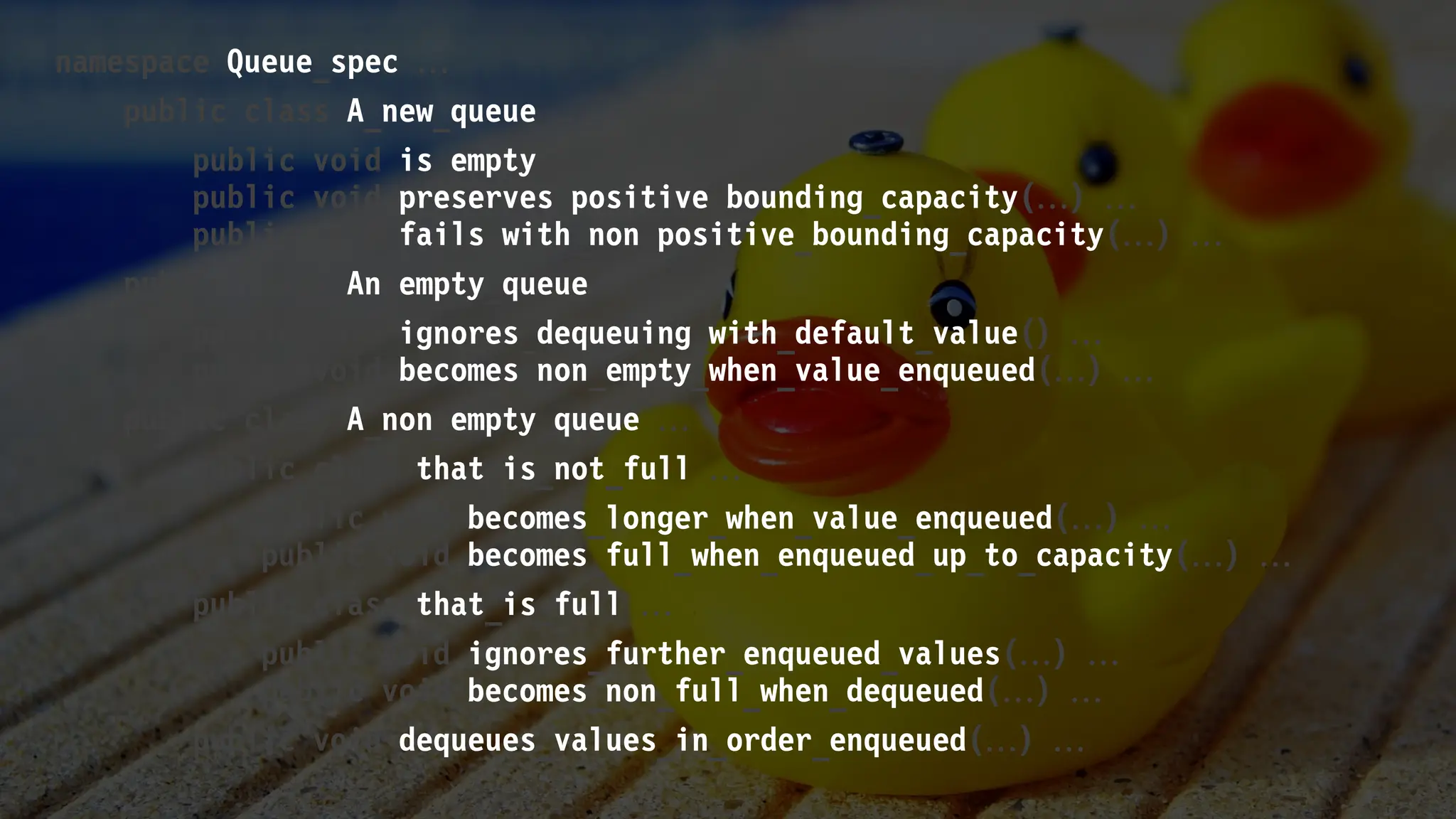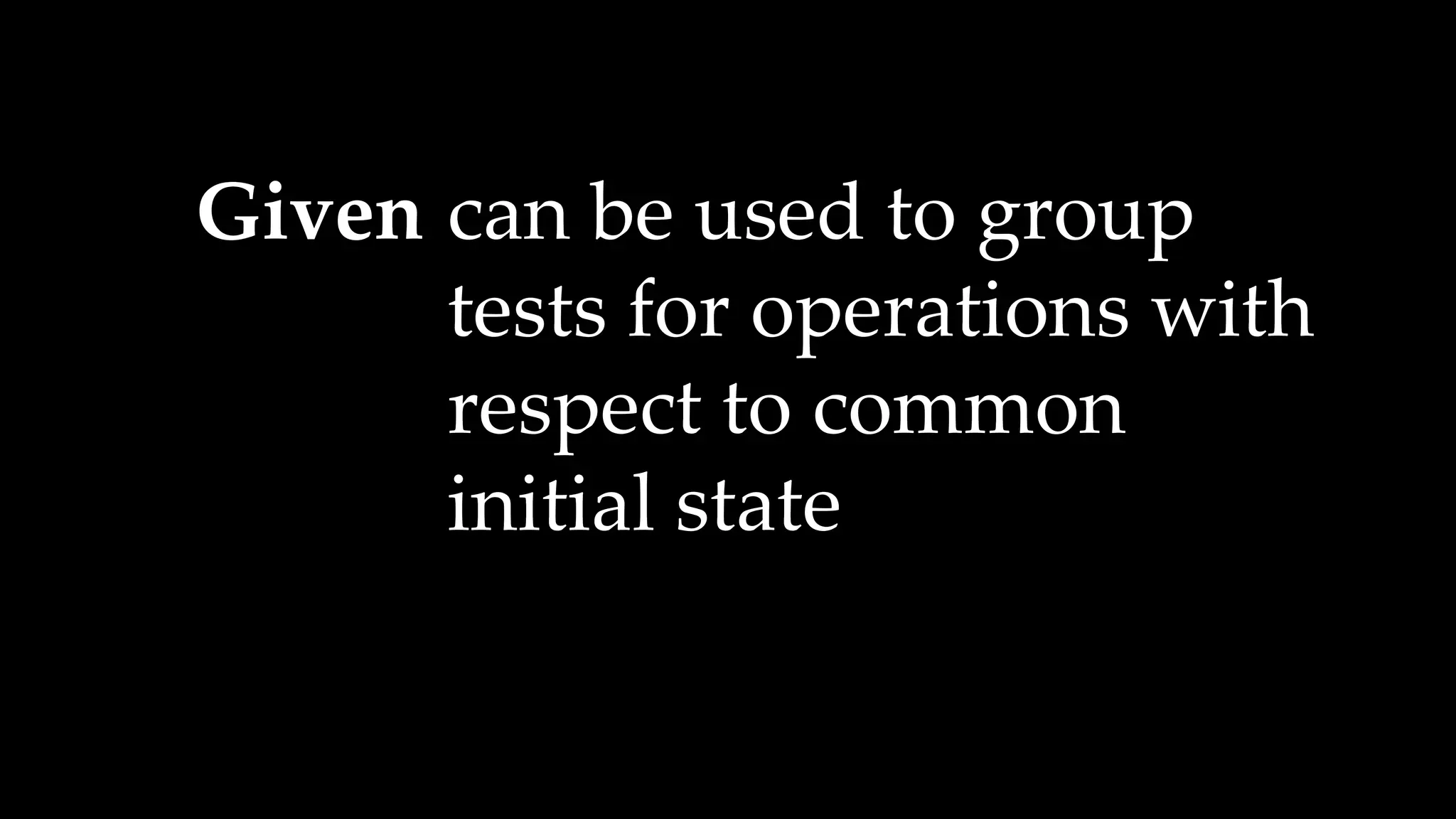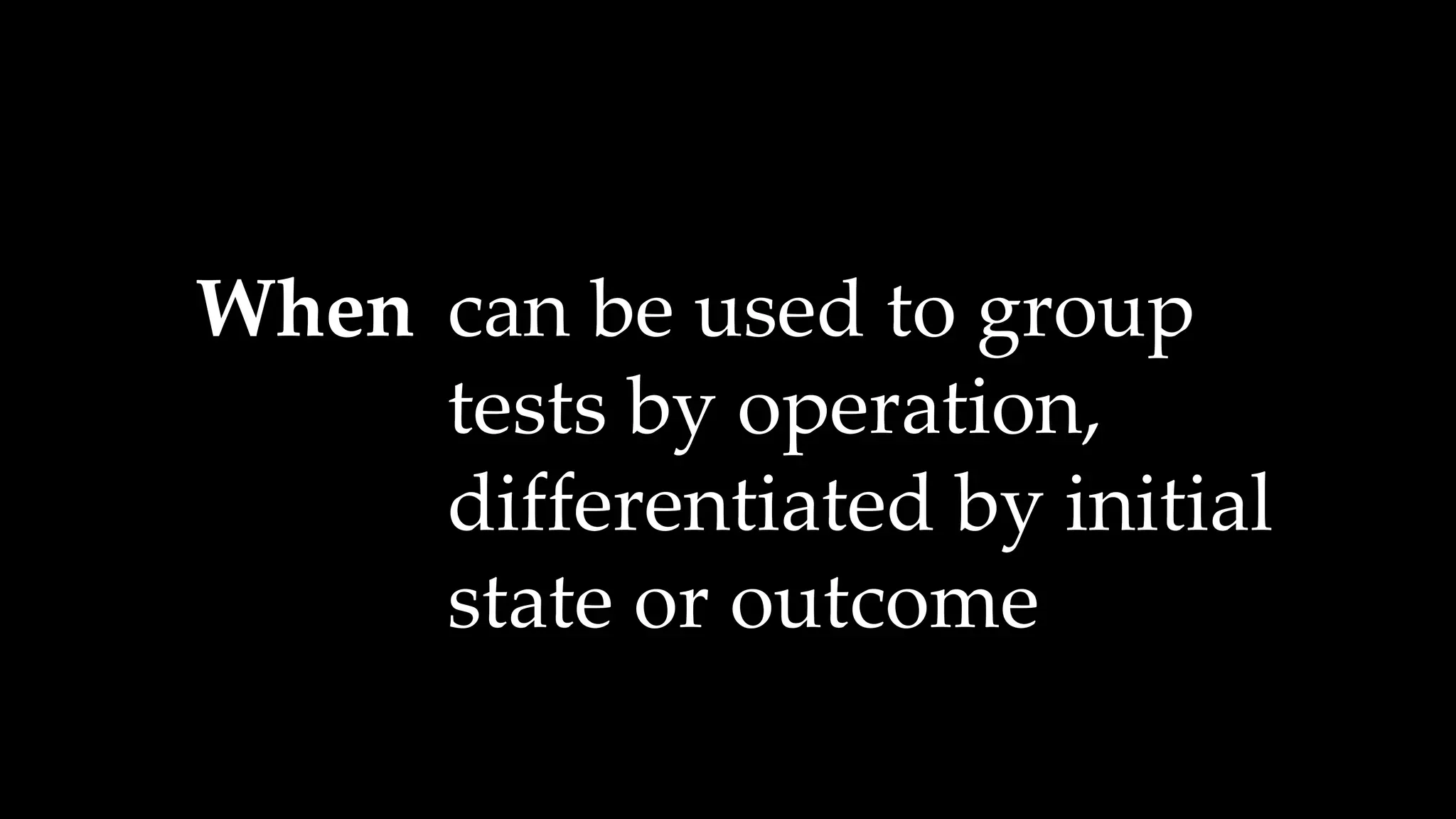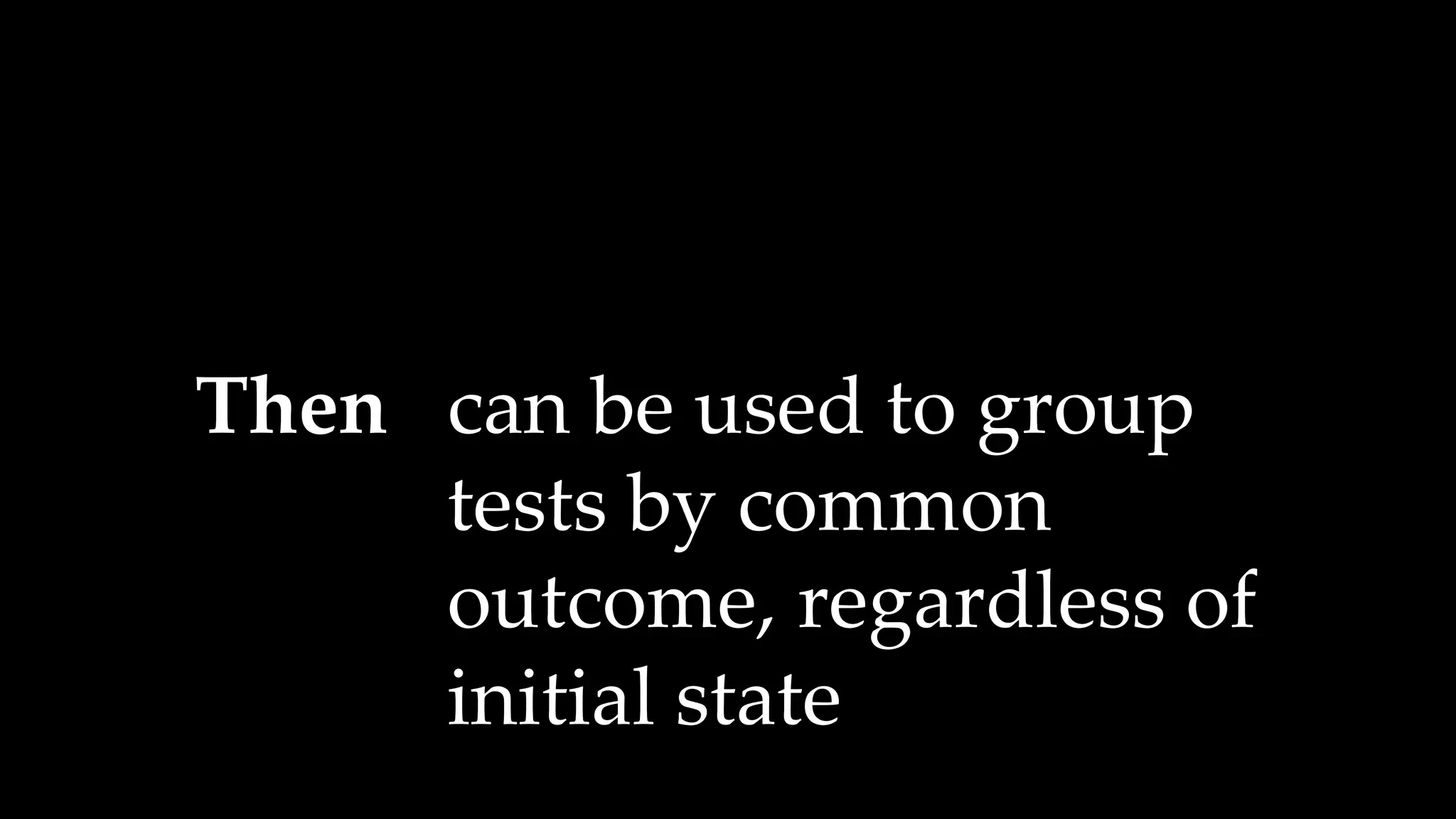The document discusses the importance of writing good unit tests in programming, emphasizing the need for tests to be meaningful and act as documentation for the code. It critiques common misconceptions about Test-Driven Development (TDD) and outlines best practices for creating effective tests, including clarity, specificity, and error handling. Additionally, it addresses various test cases related to leap years as practical examples.













![[Test]
public void Test() ](https://image.slidesharecdn.com/programwithguts-240326214940-3362f2d9/75/Program-with-GUTs-14-2048.jpg)
![[Test]
public void TestIsLeapYear() ](https://image.slidesharecdn.com/programwithguts-240326214940-3362f2d9/75/Program-with-GUTs-15-2048.jpg)
![[Test]
public void TestIsLeapYearIsOK() ](https://image.slidesharecdn.com/programwithguts-240326214940-3362f2d9/75/Program-with-GUTs-16-2048.jpg)
![[Test]
public void TestIsLeapYearIsCorrect() ](https://image.slidesharecdn.com/programwithguts-240326214940-3362f2d9/75/Program-with-GUTs-17-2048.jpg)
![[Test]
public void TestIsLeapYearWorks() ](https://image.slidesharecdn.com/programwithguts-240326214940-3362f2d9/75/Program-with-GUTs-18-2048.jpg)
![[Test]
public void TestIsLeapYearWorksAsExpected() ](https://image.slidesharecdn.com/programwithguts-240326214940-3362f2d9/75/Program-with-GUTs-19-2048.jpg)
![[Test]
public void Test1()
[Test]
public void Test2() ](https://image.slidesharecdn.com/programwithguts-240326214940-3362f2d9/75/Program-with-GUTs-20-2048.jpg)
![[Test]
public void TestLeapYears()
[Test]
public void TestNonLeapYears() ](https://image.slidesharecdn.com/programwithguts-240326214940-3362f2d9/75/Program-with-GUTs-21-2048.jpg)
![[Test]
public void TestLeapYears()
{
Assert.IsTrue(IsLeapYear(2024));
Assert.IsTrue(IsLeapYear(2000));
}
[Test]
public void TestNonLeapYears() ](https://image.slidesharecdn.com/programwithguts-240326214940-3362f2d9/75/Program-with-GUTs-22-2048.jpg)
![[Test]
public void Test2024IsALeapYear()
[Test]
public void Test2000IsALeapYear()
[Test]
public void Test2023IsNotALeapYear()
[Test]
public void Test1900IsNotALeapYear() ](https://image.slidesharecdn.com/programwithguts-240326214940-3362f2d9/75/Program-with-GUTs-23-2048.jpg)
![[Test]
public void Test2016IsALeapYear()
[Test]
public void Test2400IsALeapYear()
[Test]
public void Test2022IsNotALeapYear()
[Test]
public void Test2100IsNotALeapYear() ](https://image.slidesharecdn.com/programwithguts-240326214940-3362f2d9/75/Program-with-GUTs-24-2048.jpg)




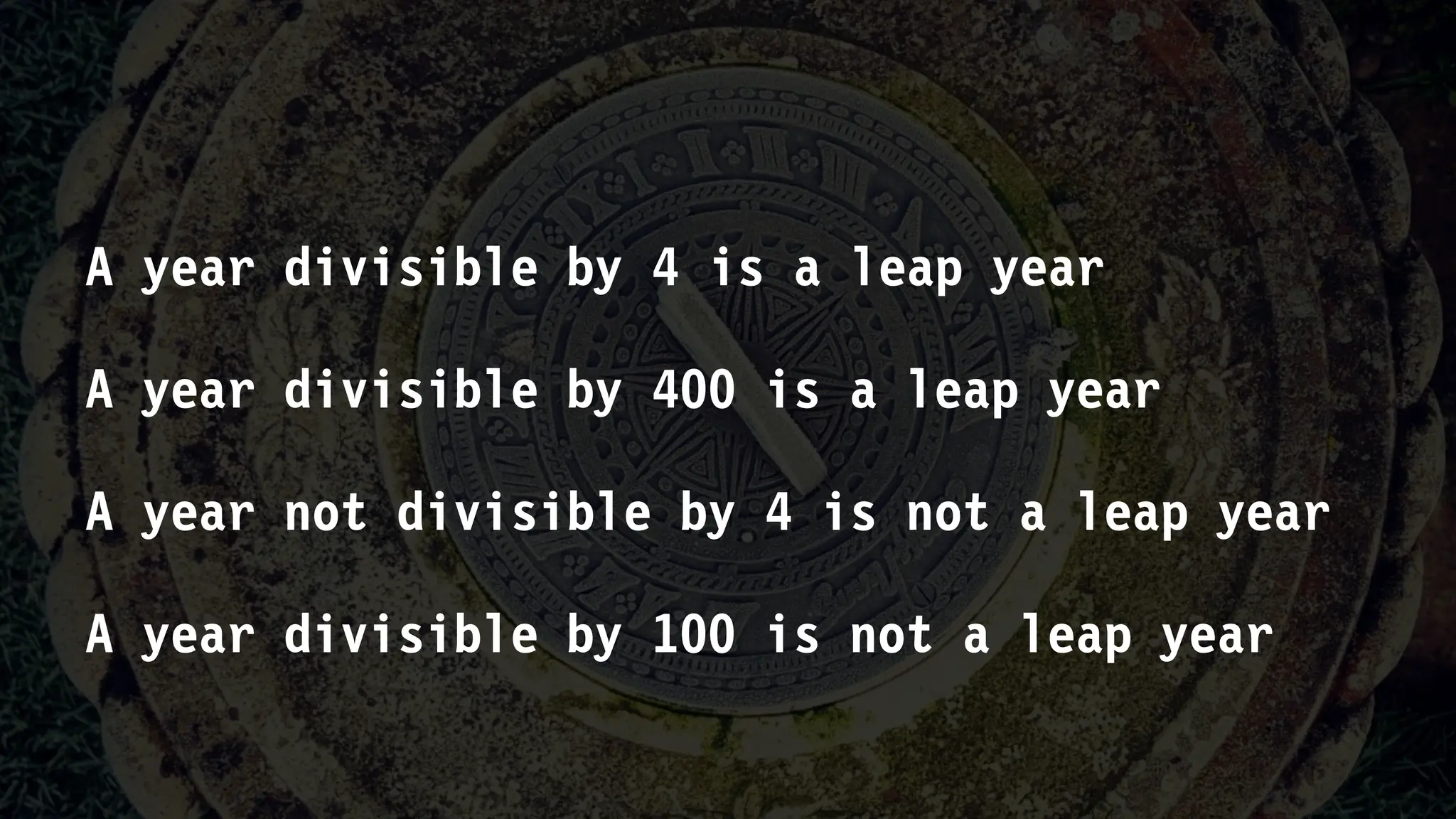
![[Test] public void
A_year_divisible_by_4_is_a_leap_year()
[Test] public void
A_year_divisible_by_400_is_a_leap_year()
[Test] public void
A_year_not_divisible_by_4_is_not_a_leap_year()
[Test] public void
A_year_divisible_by_100_is_not_a_leap_year() ](https://image.slidesharecdn.com/programwithguts-240326214940-3362f2d9/75/Program-with-GUTs-30-2048.jpg)
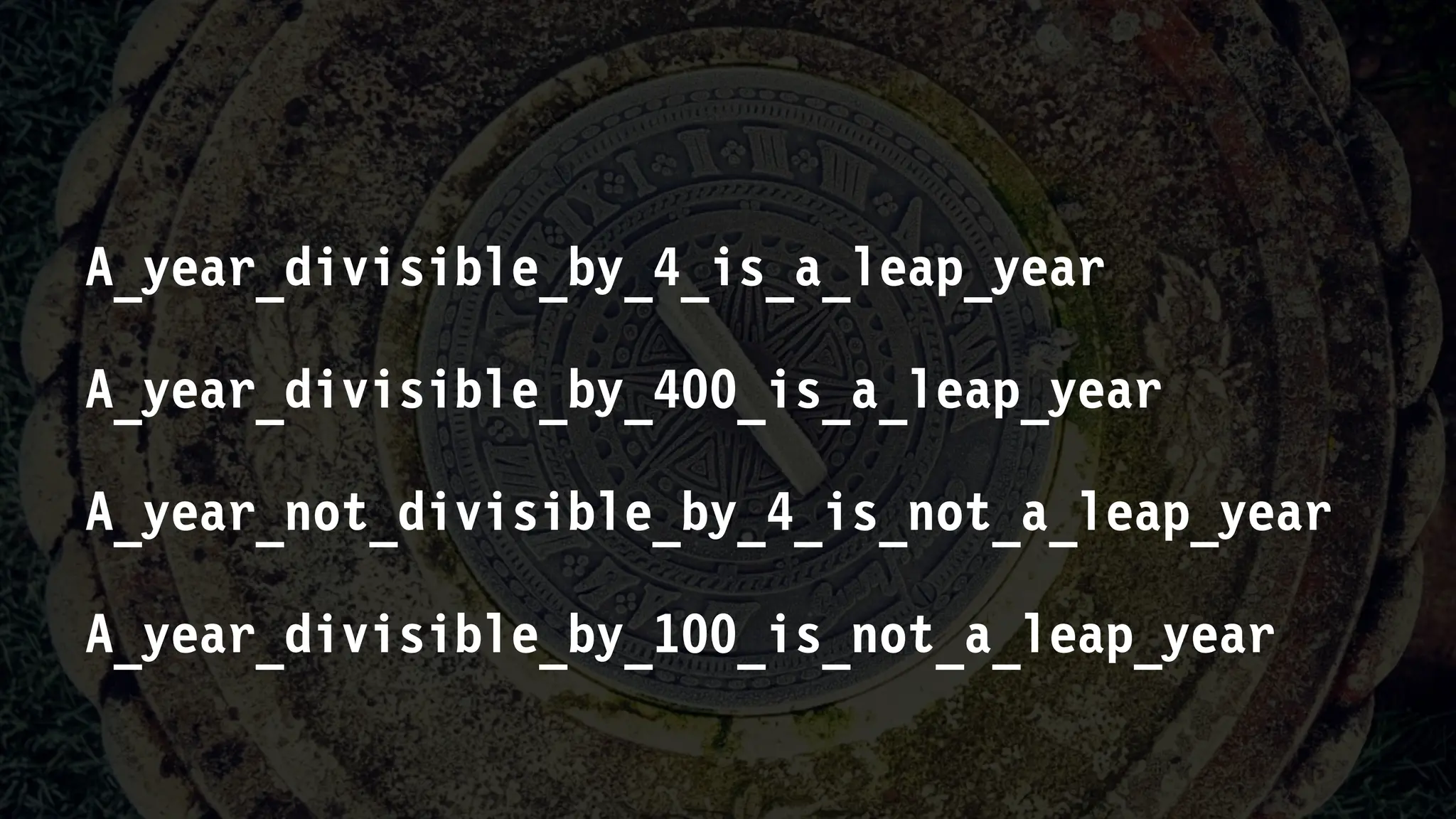
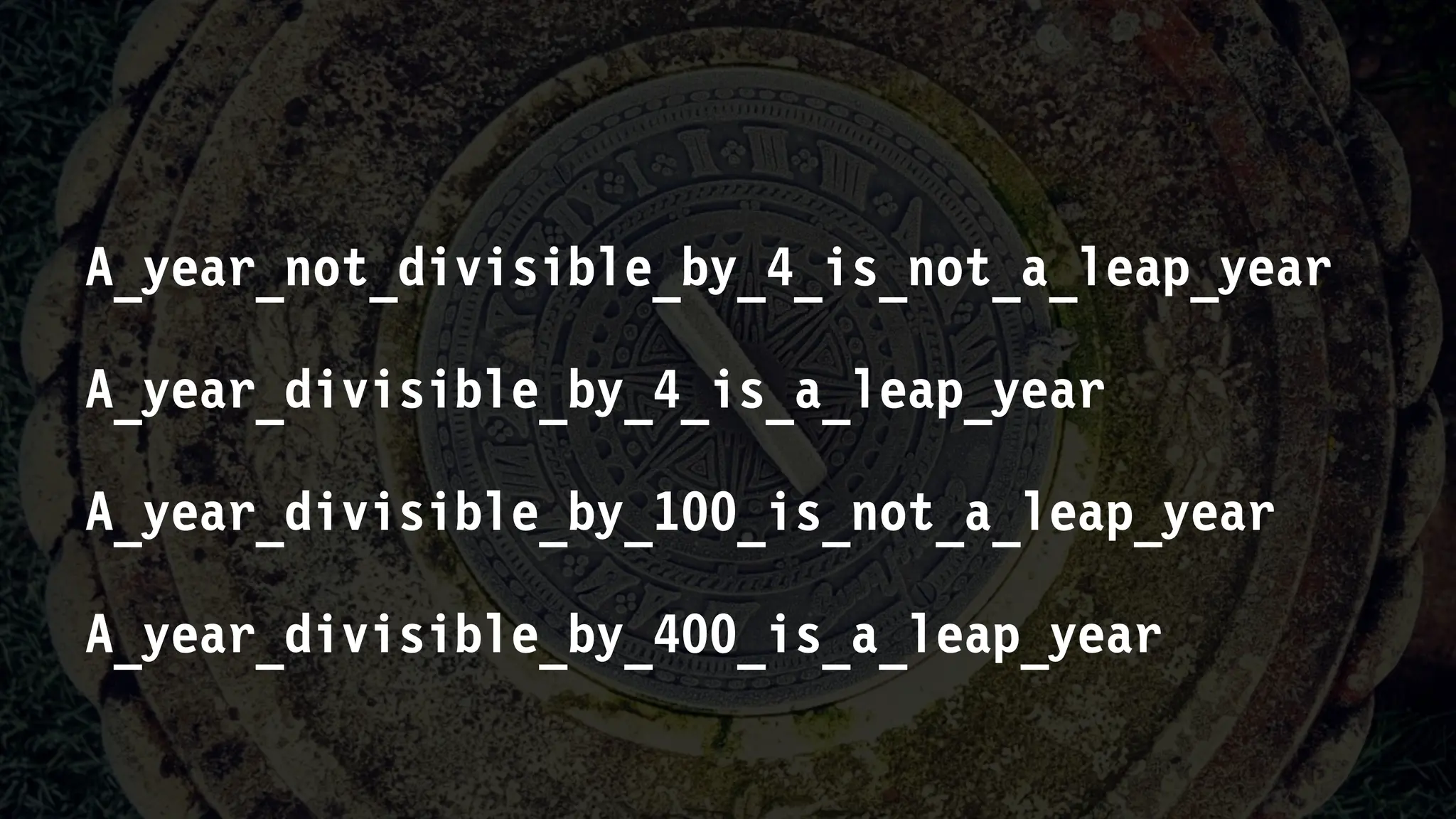
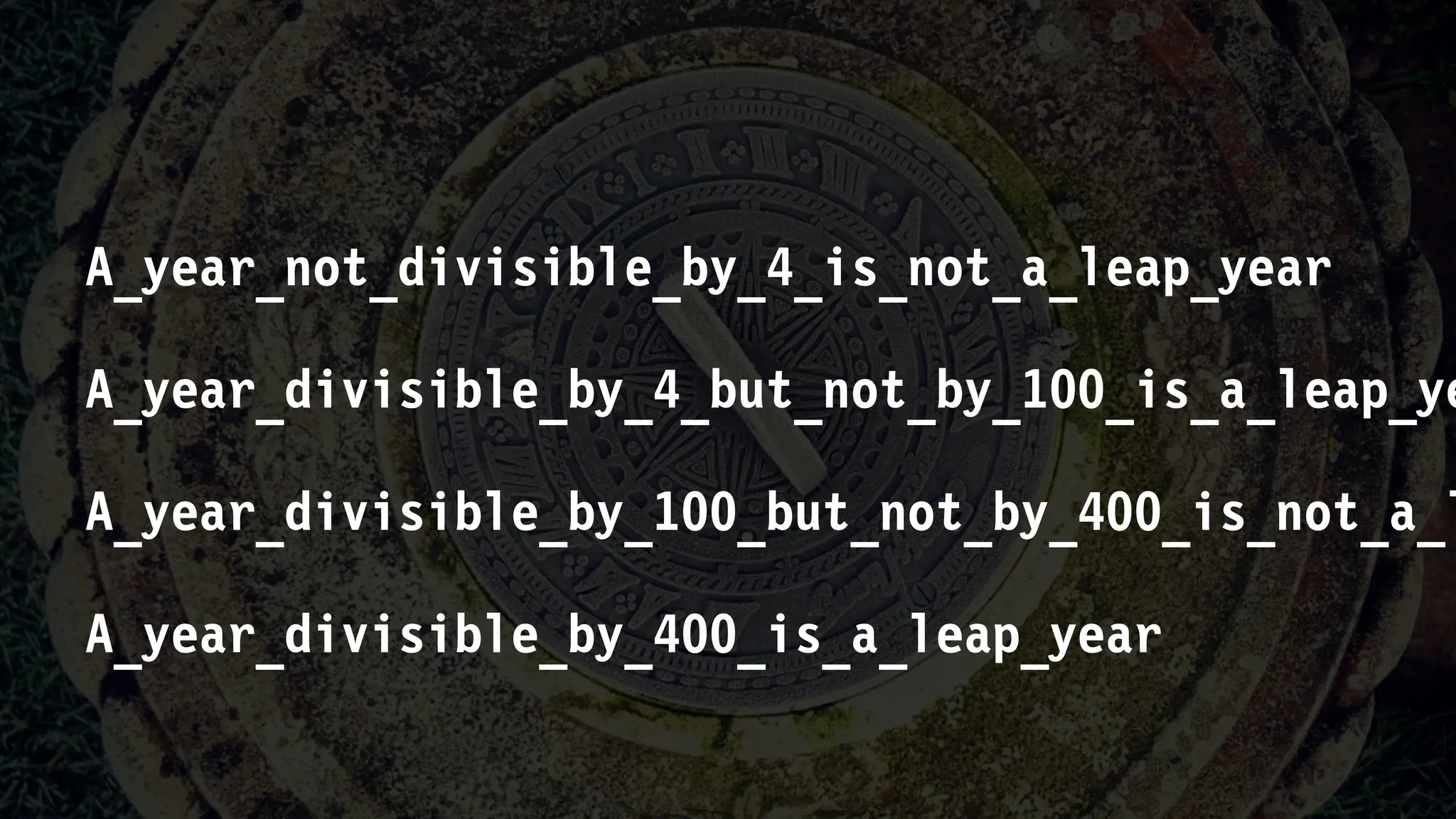
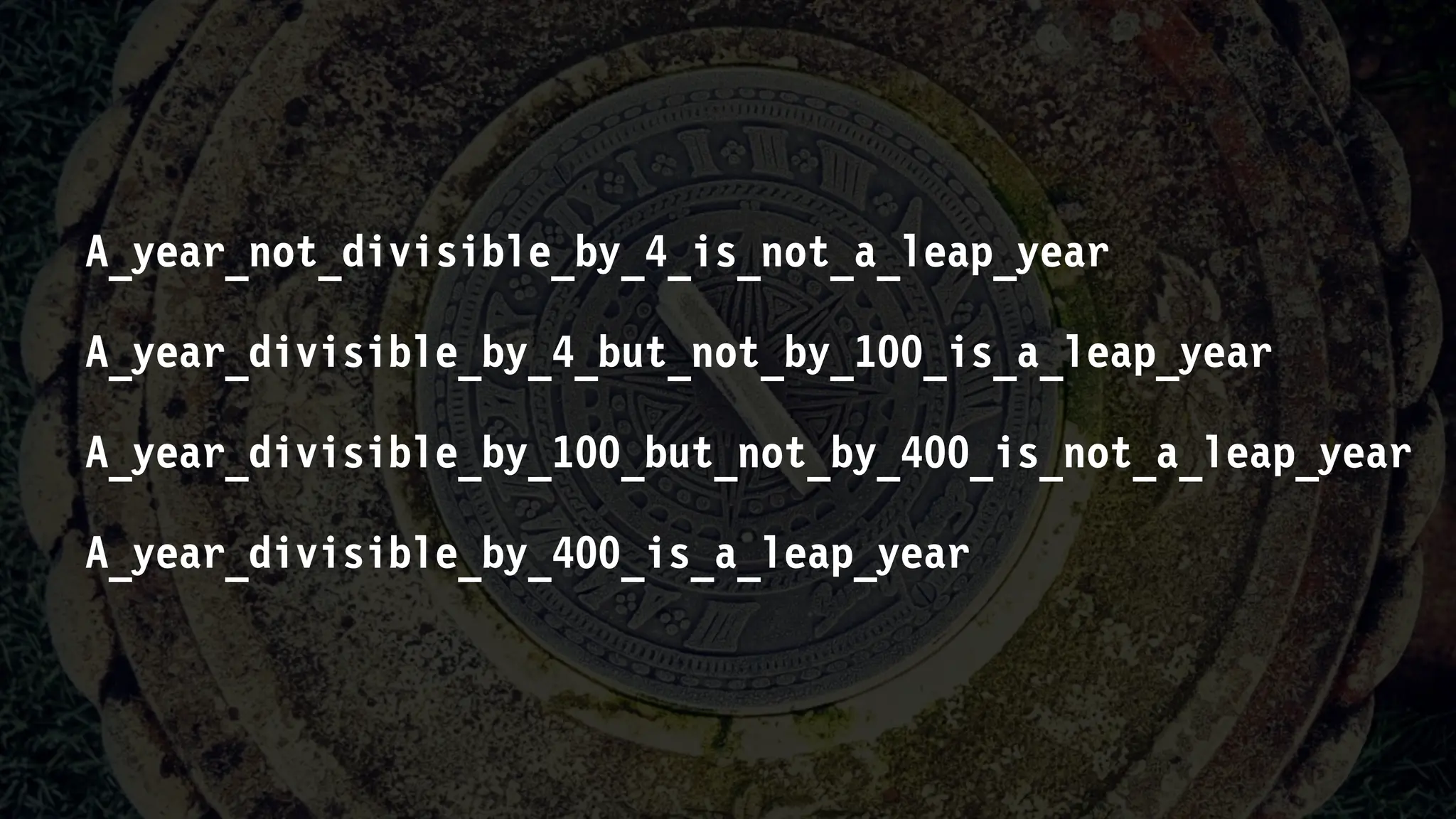
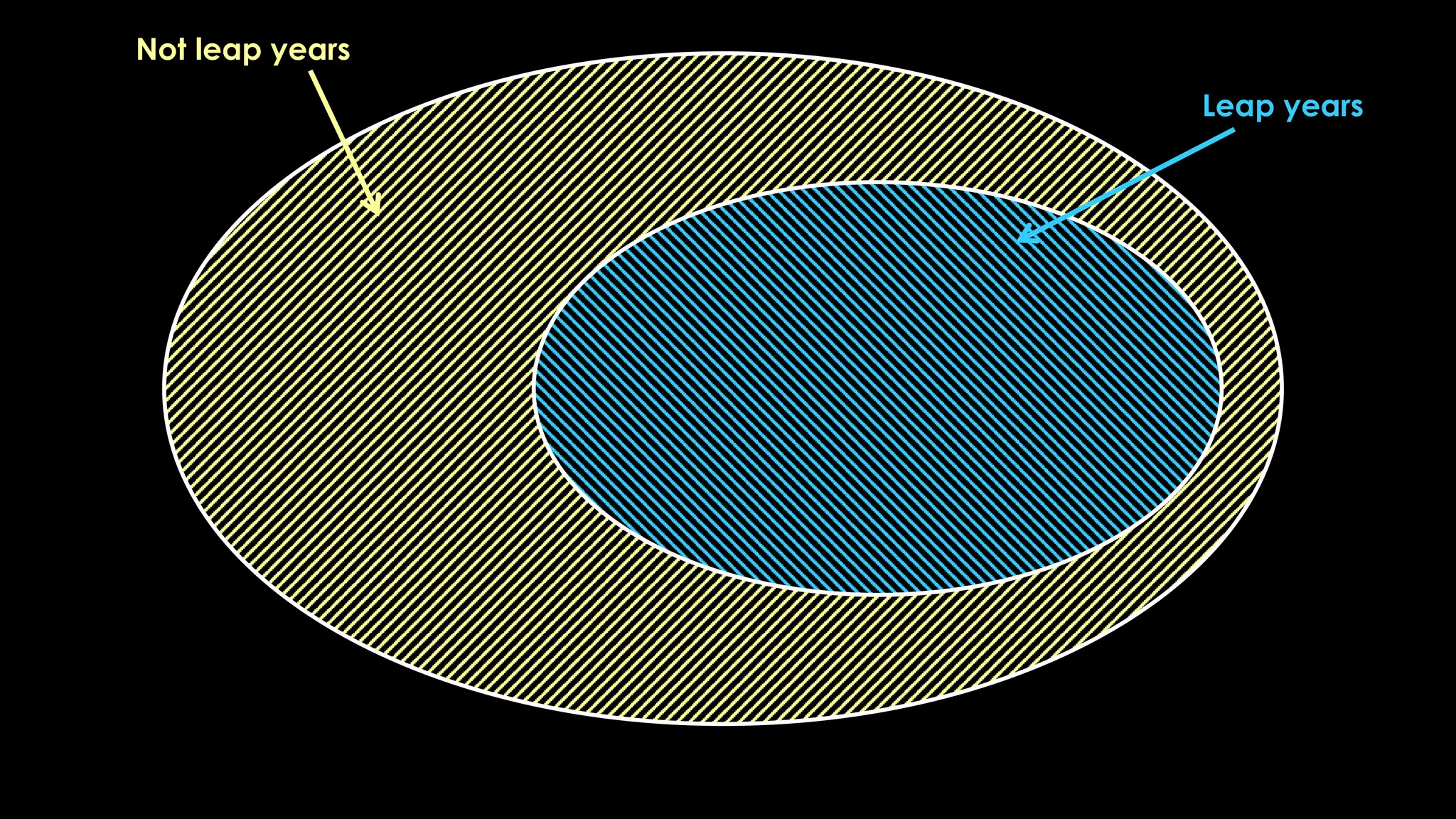
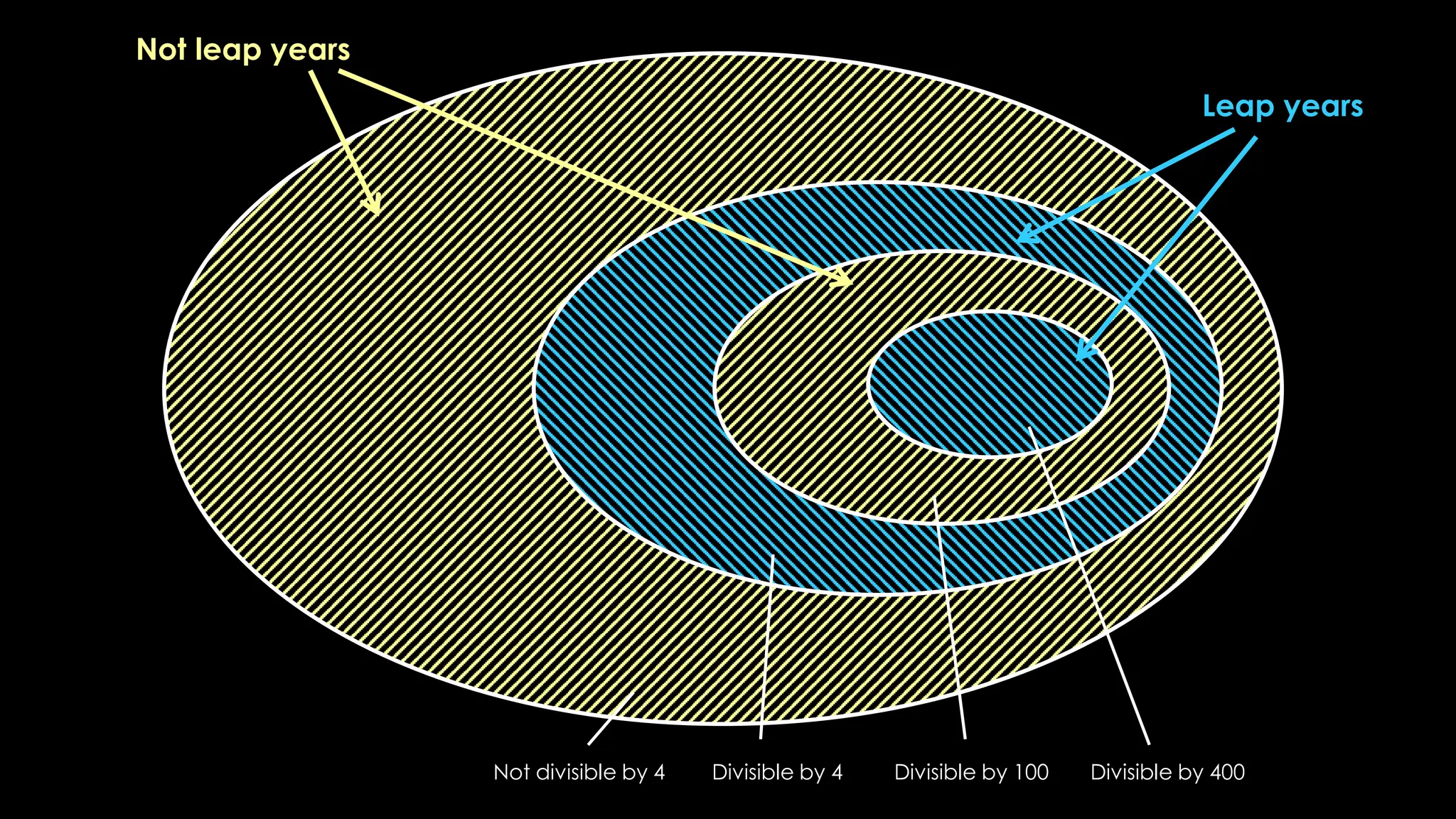
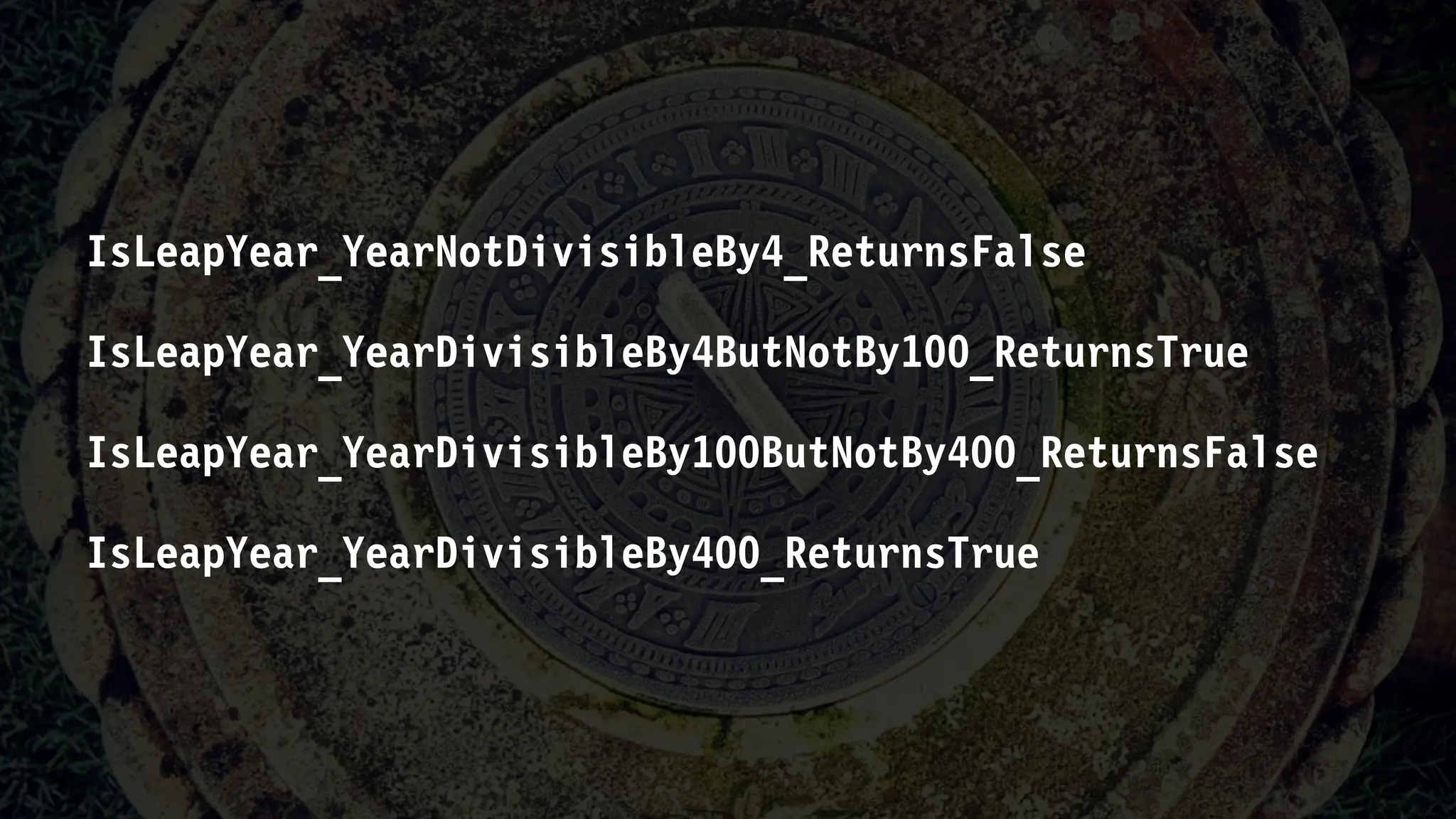

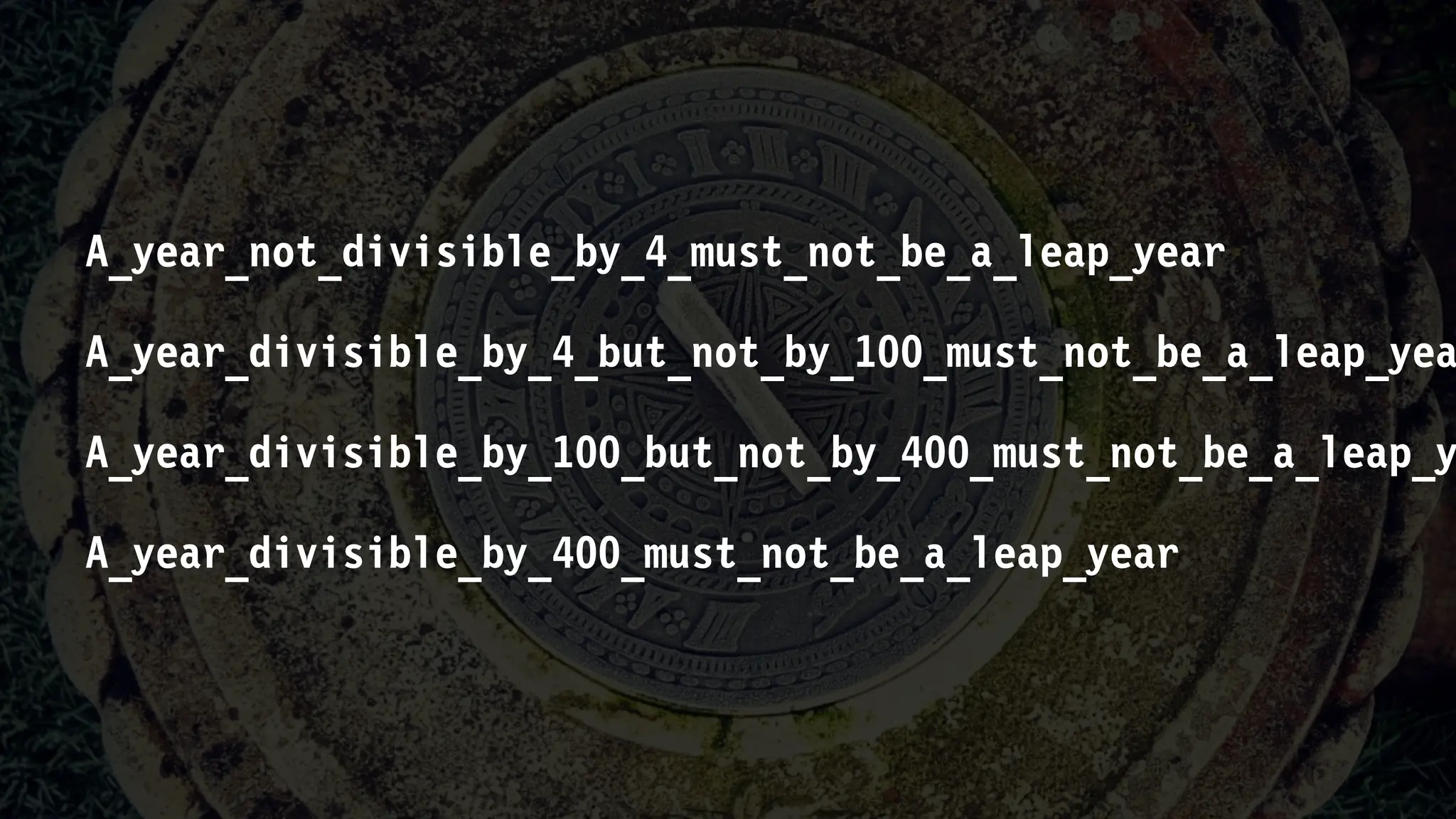


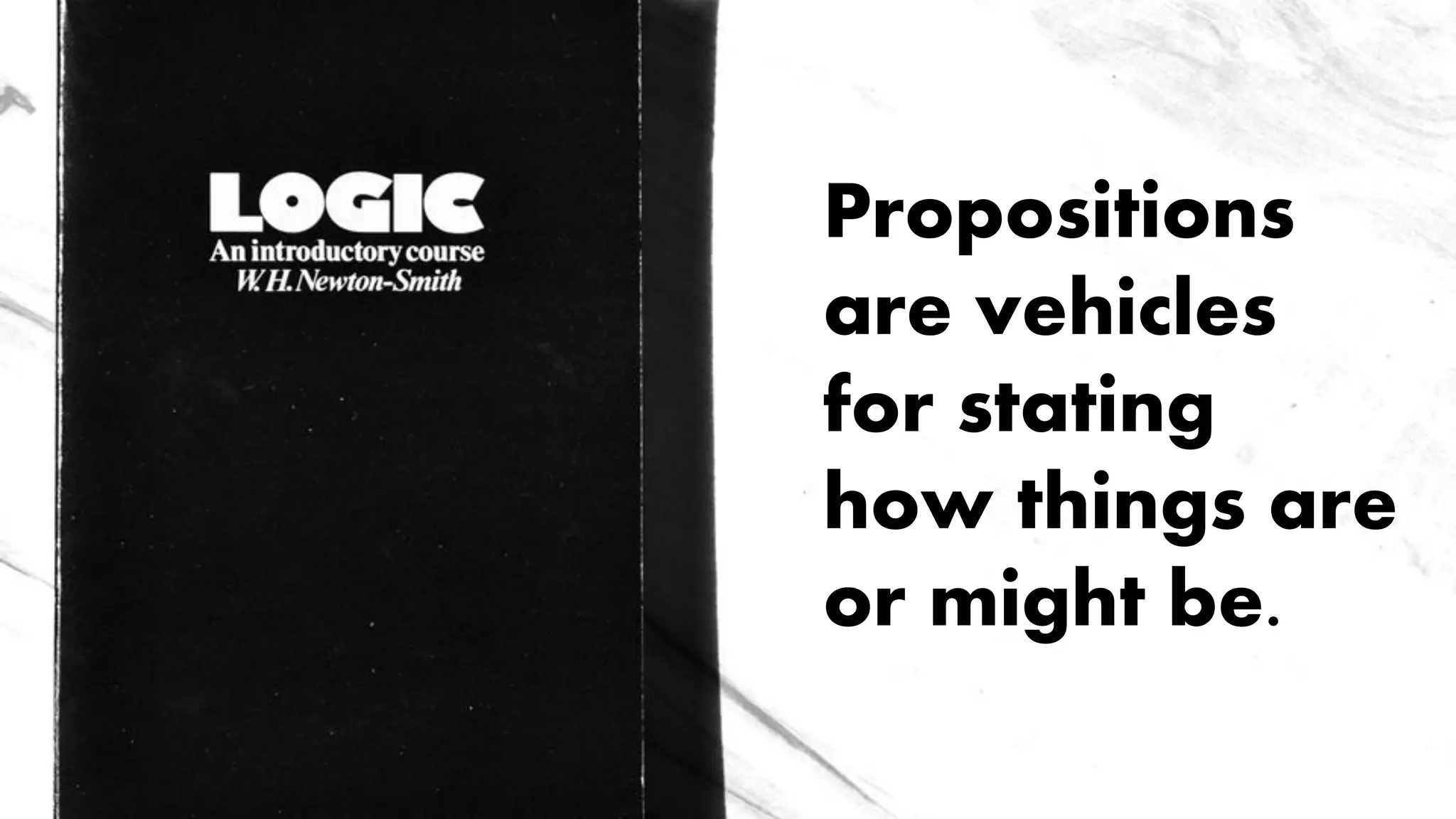
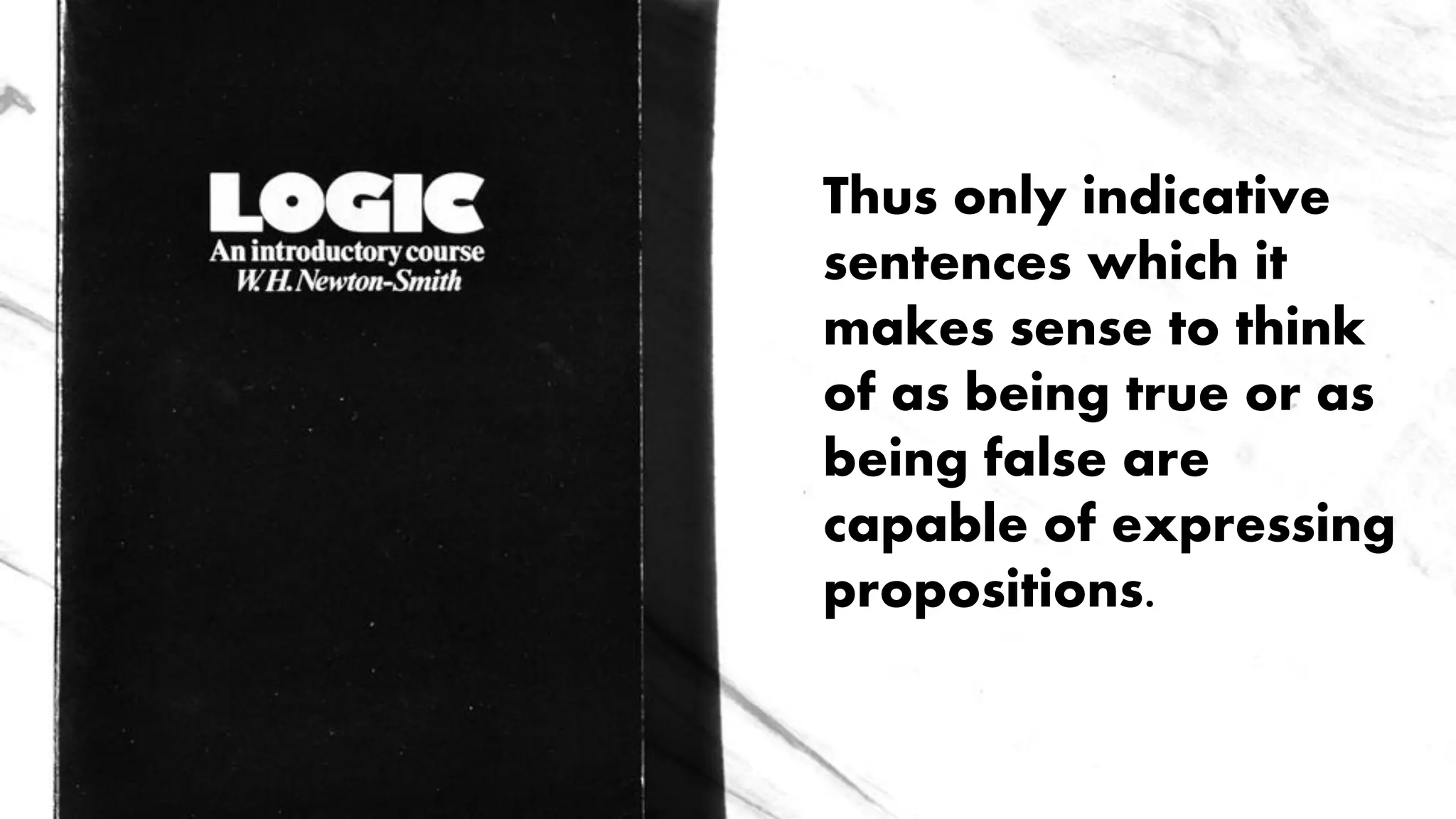
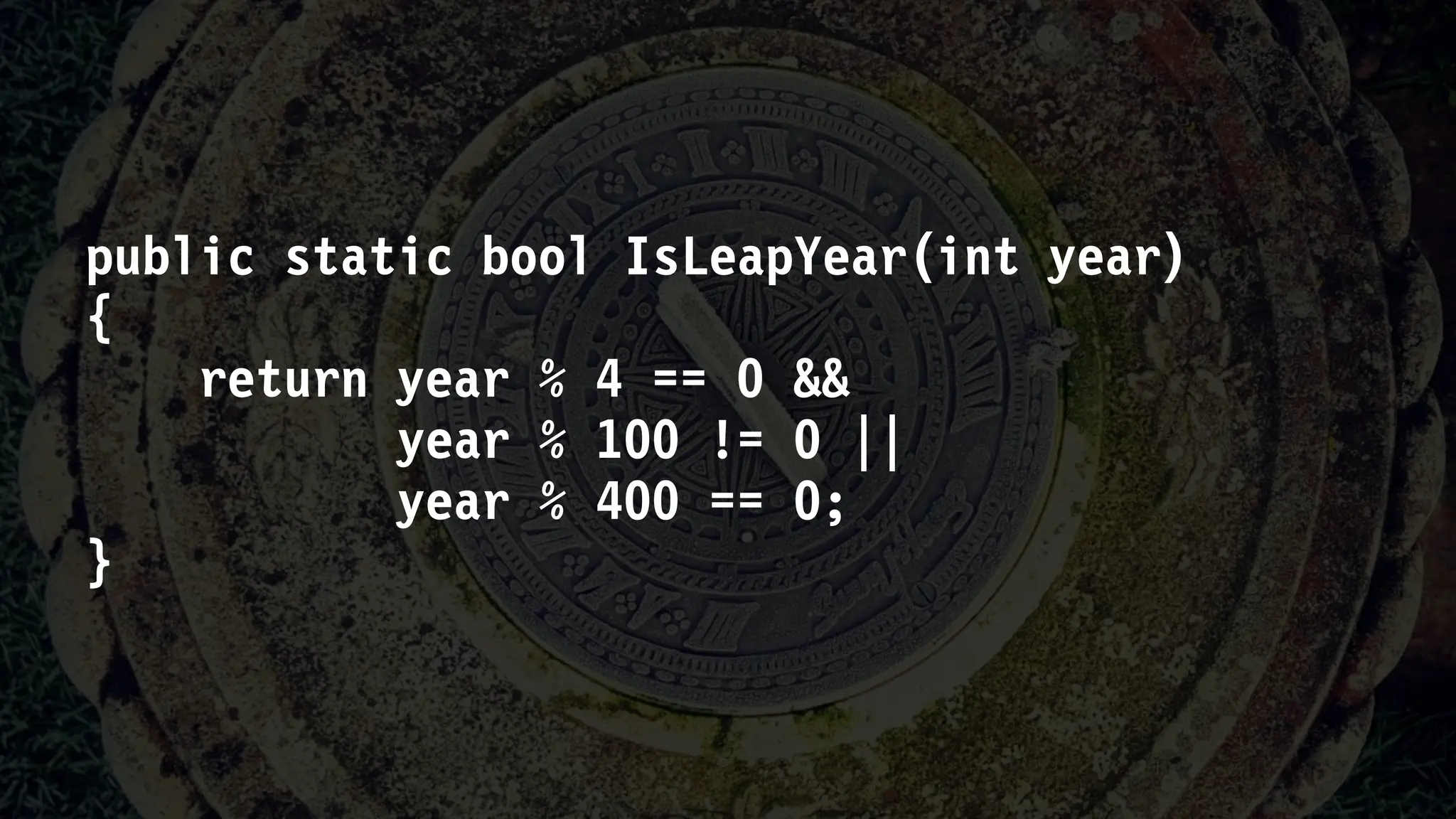
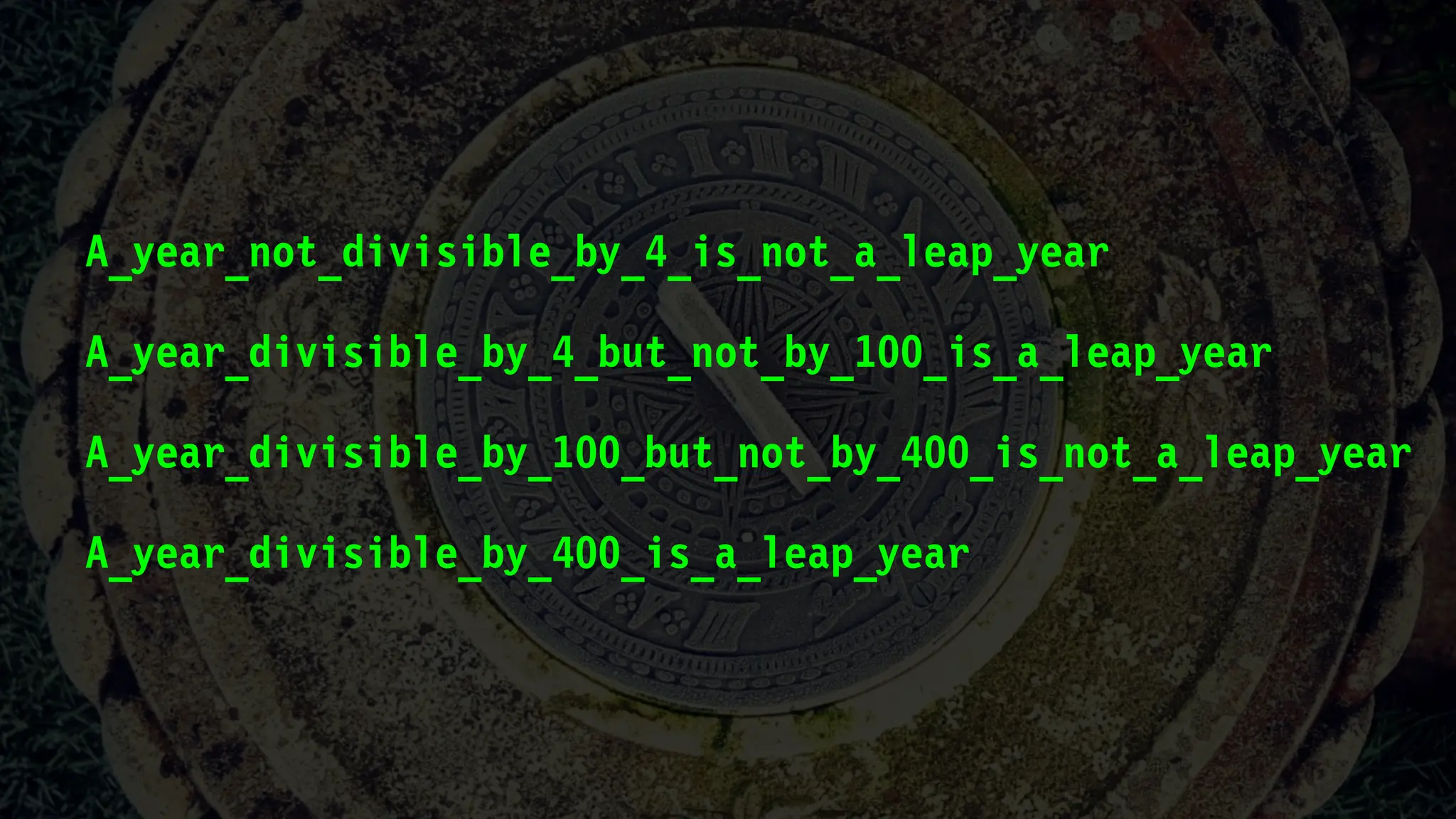
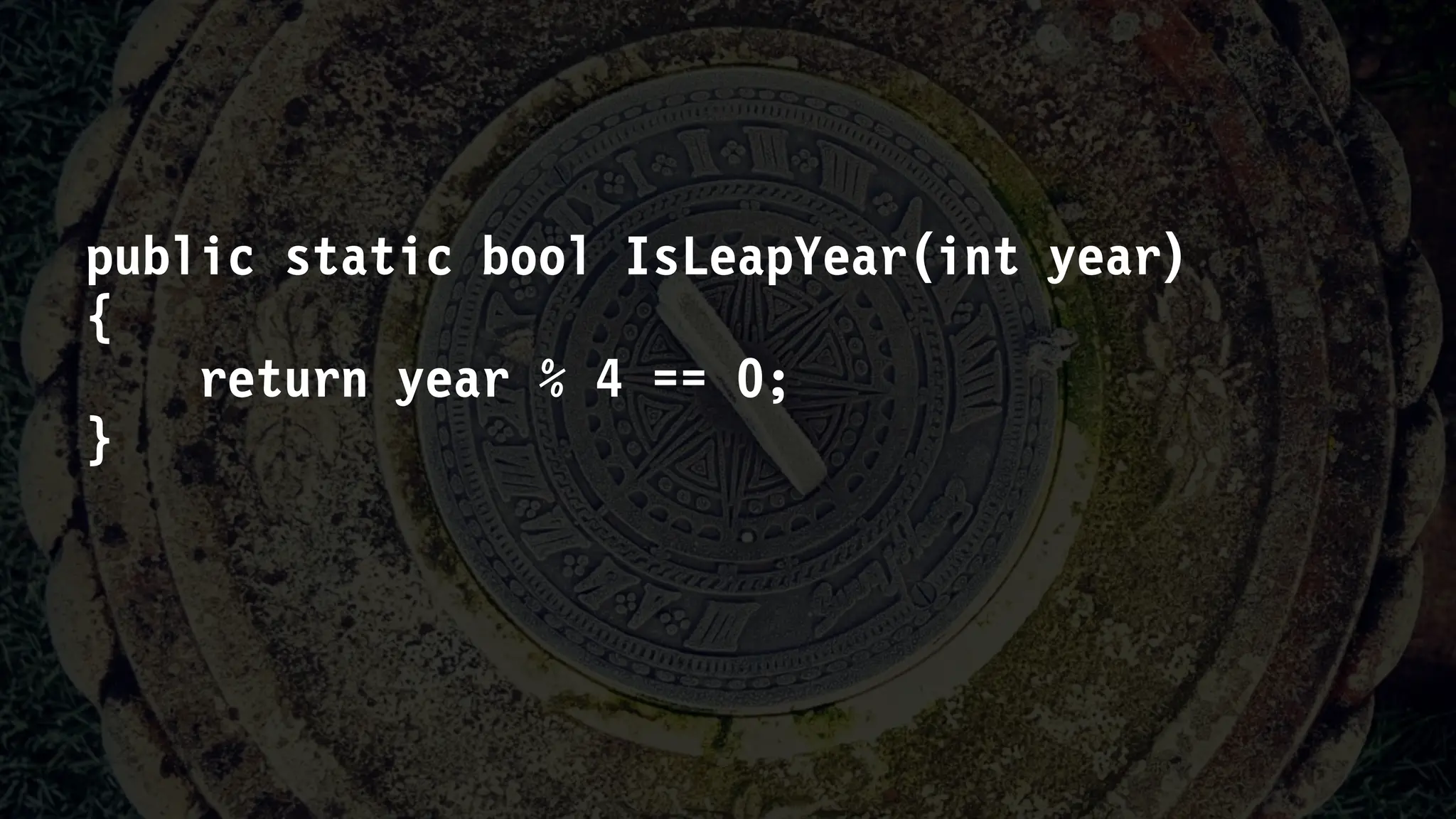
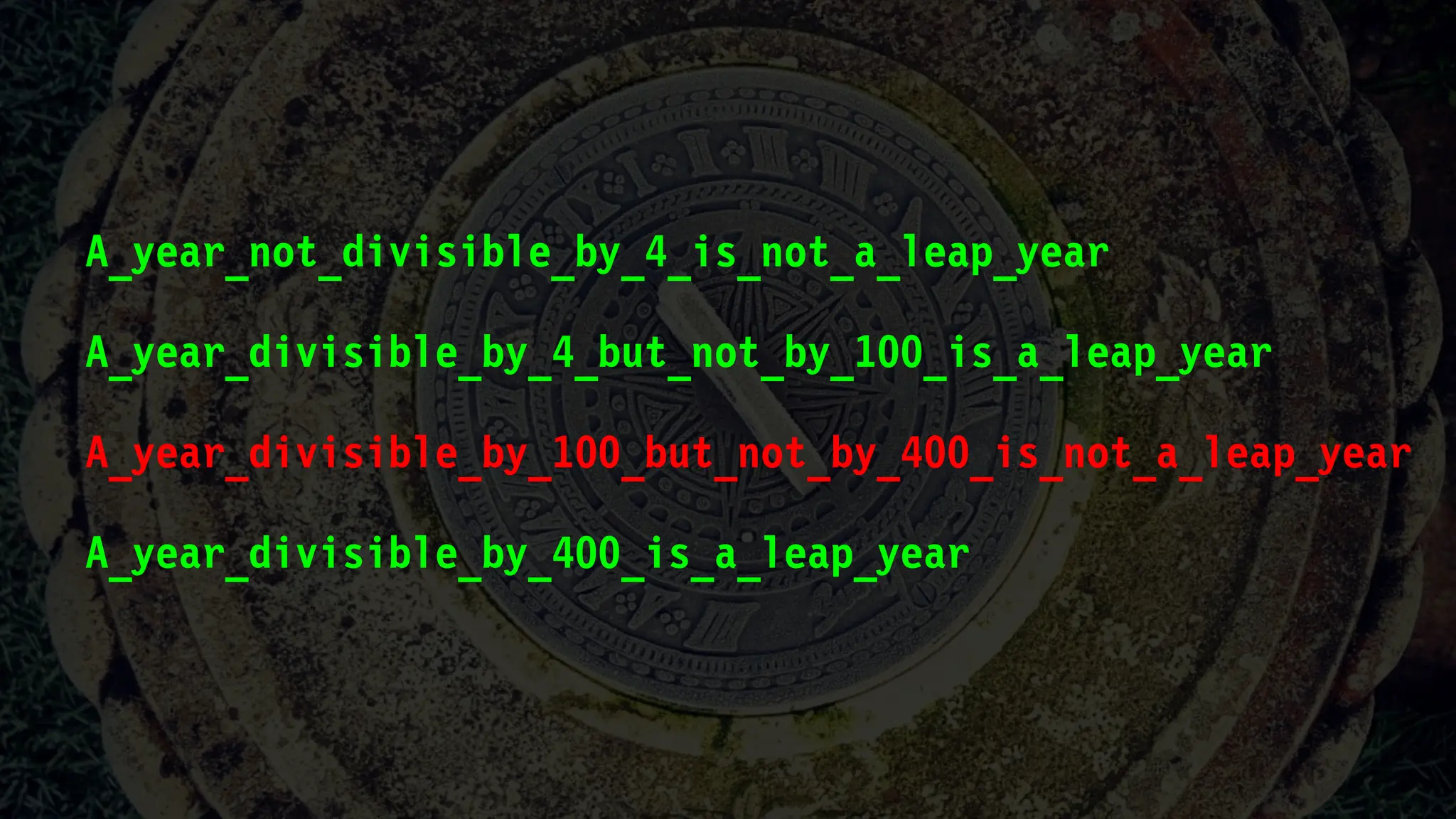


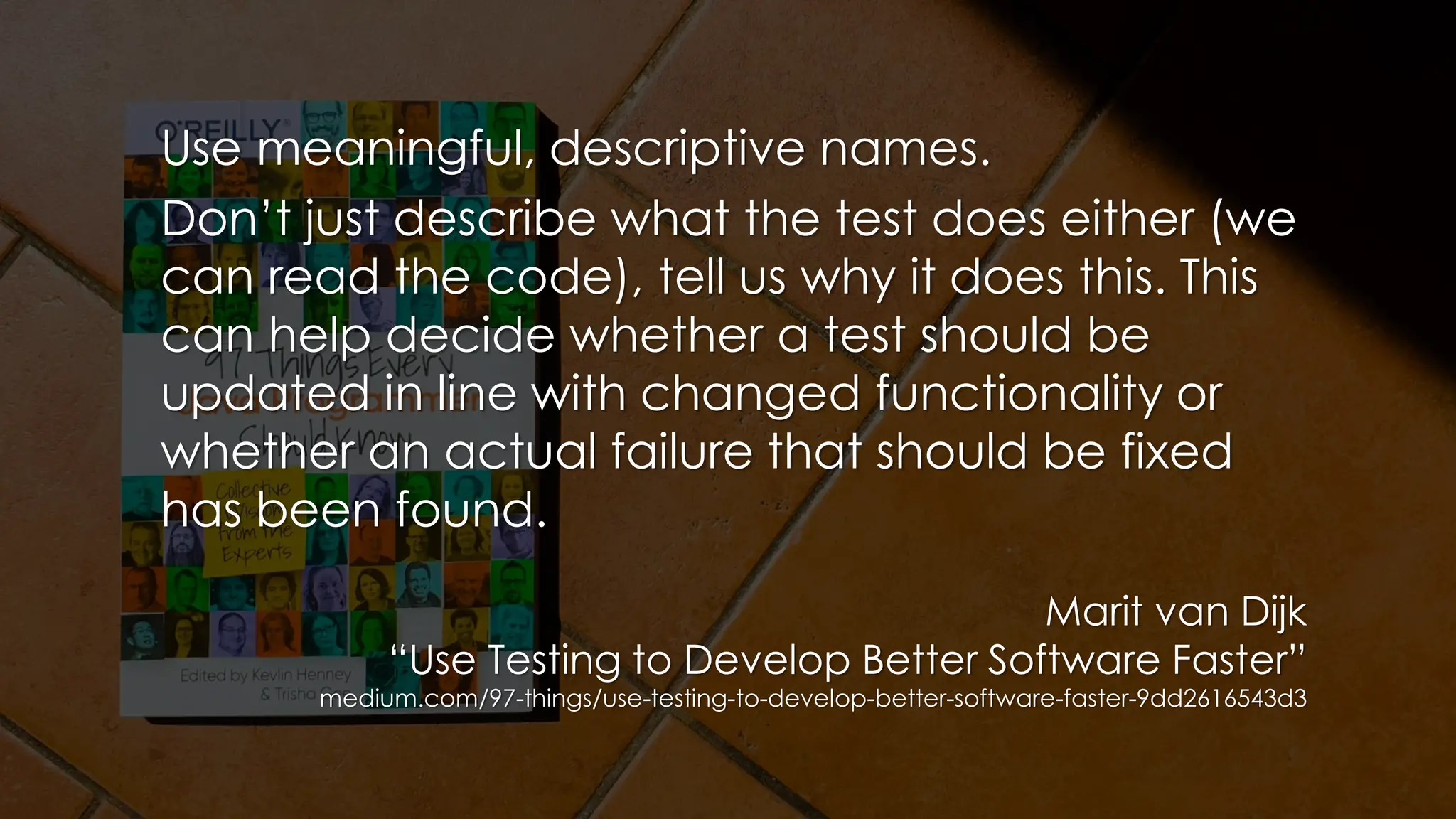

![public class Leap_year_spec
{
public class A_year_is_a_leap_year
{
[Test]
public void if_it_is_divisible_by_4_but_not_by_100()
[Test]
public void if_it_is_divisible_by_400()
}
public class A_year_is_not_a_leap_year
{
[Test]
public void if_it_is_not_divisible_by_4()
[Test]
public void if_it_is_divisible_by_100_but_not_by_400()
}
}](https://image.slidesharecdn.com/programwithguts-240326214940-3362f2d9/75/Program-with-GUTs-52-2048.jpg)
![namespace Leap_year_spec
{
public class A_year_is_a_leap_year
{
[Test]
public void if_it_is_divisible_by_4_but_not_by_100()
[Test]
public void if_it_is_divisible_by_400()
}
public class A_year_is_not_a_leap_year
{
[Test]
public void if_it_is_not_divisible_by_4()
[Test]
public void if_it_is_divisible_by_100_but_not_by_400()
}
}](https://image.slidesharecdn.com/programwithguts-240326214940-3362f2d9/75/Program-with-GUTs-53-2048.jpg)
![namespace Leap_year_spec
{
public class A_year_is_a_leap_year
{
[Test]
public void if_it_is_divisible_by_4_but_not_by_100()
[Test]
public void if_it_is_divisible_by_400()
}
public class A_year_is_not_a_leap_year
{
[Test]
public void if_it_is_not_divisible_by_4()
[Test]
public void if_it_is_divisible_by_100_but_not_by_400()
}
}](https://image.slidesharecdn.com/programwithguts-240326214940-3362f2d9/75/Program-with-GUTs-54-2048.jpg)

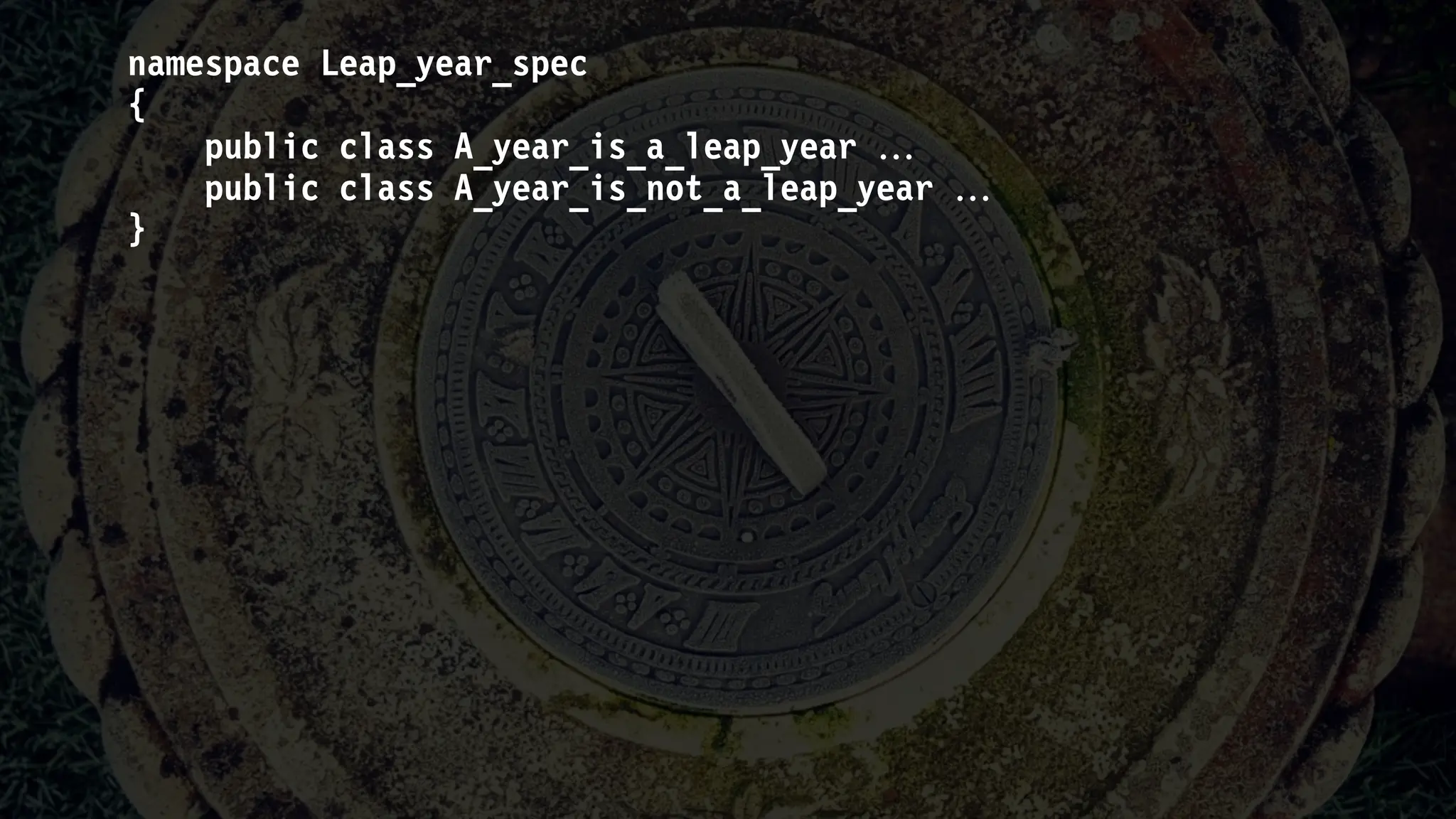
![namespace Leap_year_spec
{
public class A_year_is_a_leap_year
public class A_year_is_not_a_leap_year
{
[Test]
public void if_it_is_not_divisible_by_4()
{
Assert.IsFalse(IsLeapYear(2023));
}
[Test]
public void if_it_is_divisible_by_100_but_not_by_400()
}
}](https://image.slidesharecdn.com/programwithguts-240326214940-3362f2d9/75/Program-with-GUTs-57-2048.jpg)
![namespace Leap_year_spec
{
public class A_year_is_a_leap_year
public class A_year_is_not_a_leap_year
{
[Test]
public void if_it_is_not_divisible_by_4()
{
Assert.IsFalse(IsLeapYear(2023));
Assert.IsFalse(IsLeapYear(2022));
Assert.IsFalse(IsLeapYear(1999));
Assert.IsFalse(IsLeapYear(3));
}
[Test]
public void if_it_is_divisible_by_100_but_not_by_400()
}
}](https://image.slidesharecdn.com/programwithguts-240326214940-3362f2d9/75/Program-with-GUTs-58-2048.jpg)
![namespace Leap_year_spec
{
public class A_year_is_a_leap_year
public class A_year_is_not_a_leap_year
{
[TestCase(2023)]
[TestCase(2022)]
[TestCase(1999)]
[TestCase(3)]
public void if_it_is_not_divisible_by_4(int year)
{
Assert.IsFalse(IsLeapYear(year));
}
[Test]
public void if_it_is_divisible_by_100_but_not_by_400()
}
}](https://image.slidesharecdn.com/programwithguts-240326214940-3362f2d9/75/Program-with-GUTs-59-2048.jpg)
![namespace Leap_year_spec
{
public class A_year_is_a_leap_year
public class A_year_is_not_a_leap_year
{
[Test]
public void if_it_is_not_divisible_by_4(
[Values(2023, 2022, 1999, 3)] int year)
{
Assert.IsFalse(IsLeapYear(year));
}
[Test]
public void if_it_is_divisible_by_100_but_not_by_400()
}
}](https://image.slidesharecdn.com/programwithguts-240326214940-3362f2d9/75/Program-with-GUTs-60-2048.jpg)
![namespace Leap_year_spec
{
public class A_year_is_a_leap_year
{
[Test]
public void if_it_is_divisible_by_4_but_not_by_100(
[Values(2024, 2016, 1984, 4) int year)
[Test]
public void if_it_is_divisible_by_400(
[Range(400, 4000, 400)] int year)
}
public class A_year_is_not_a_leap_year
{
[Test]
public void if_it_is_not_divisible_by_4(
[Values(2023, 2022, 1999, 3)] int year)
[Test]
public void if_it_is_divisible_by_100_but_not_by_400(
[Values(2100, 1900, 1800, 100)] int year)
}
}](https://image.slidesharecdn.com/programwithguts-240326214940-3362f2d9/75/Program-with-GUTs-61-2048.jpg)
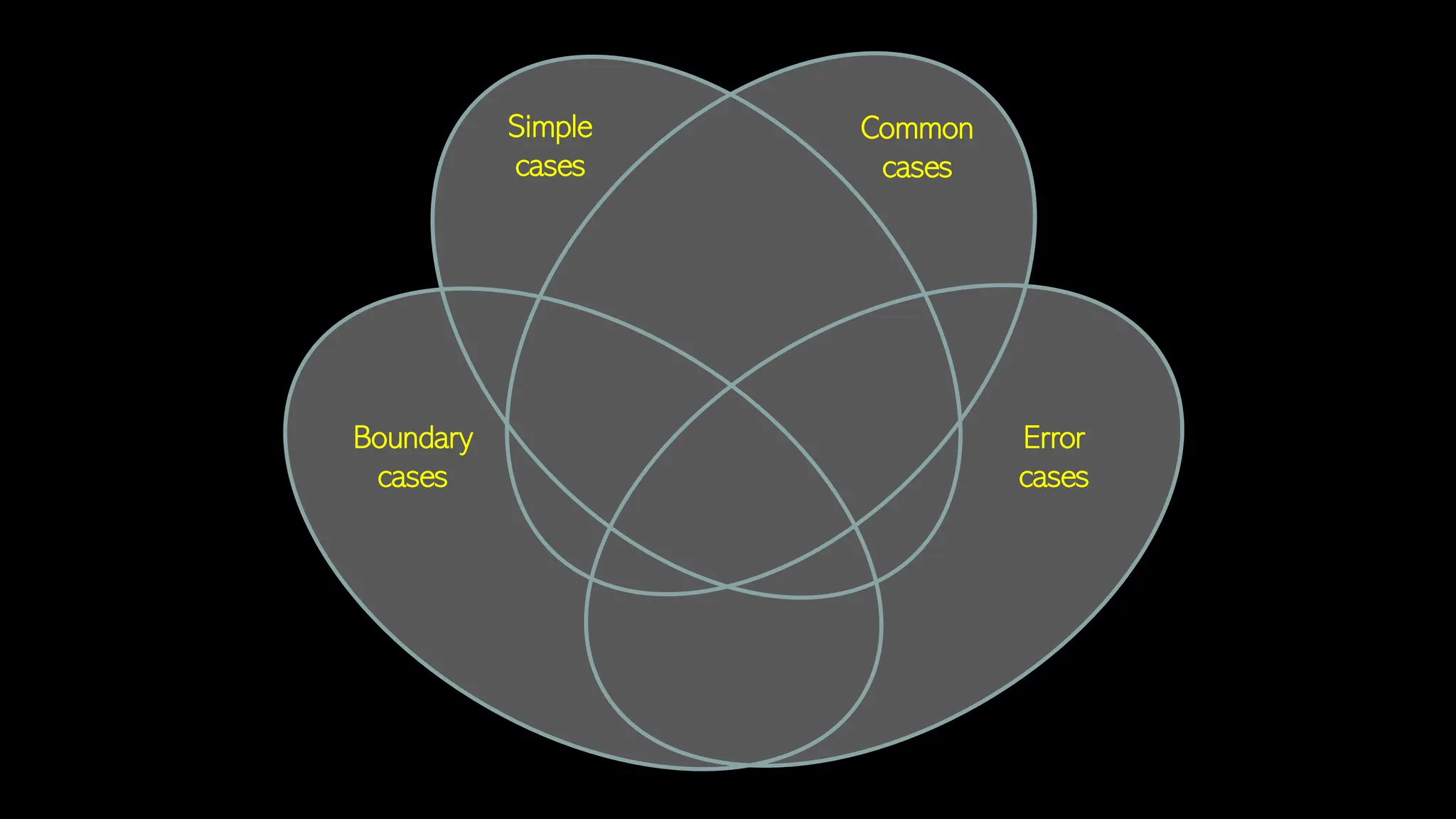
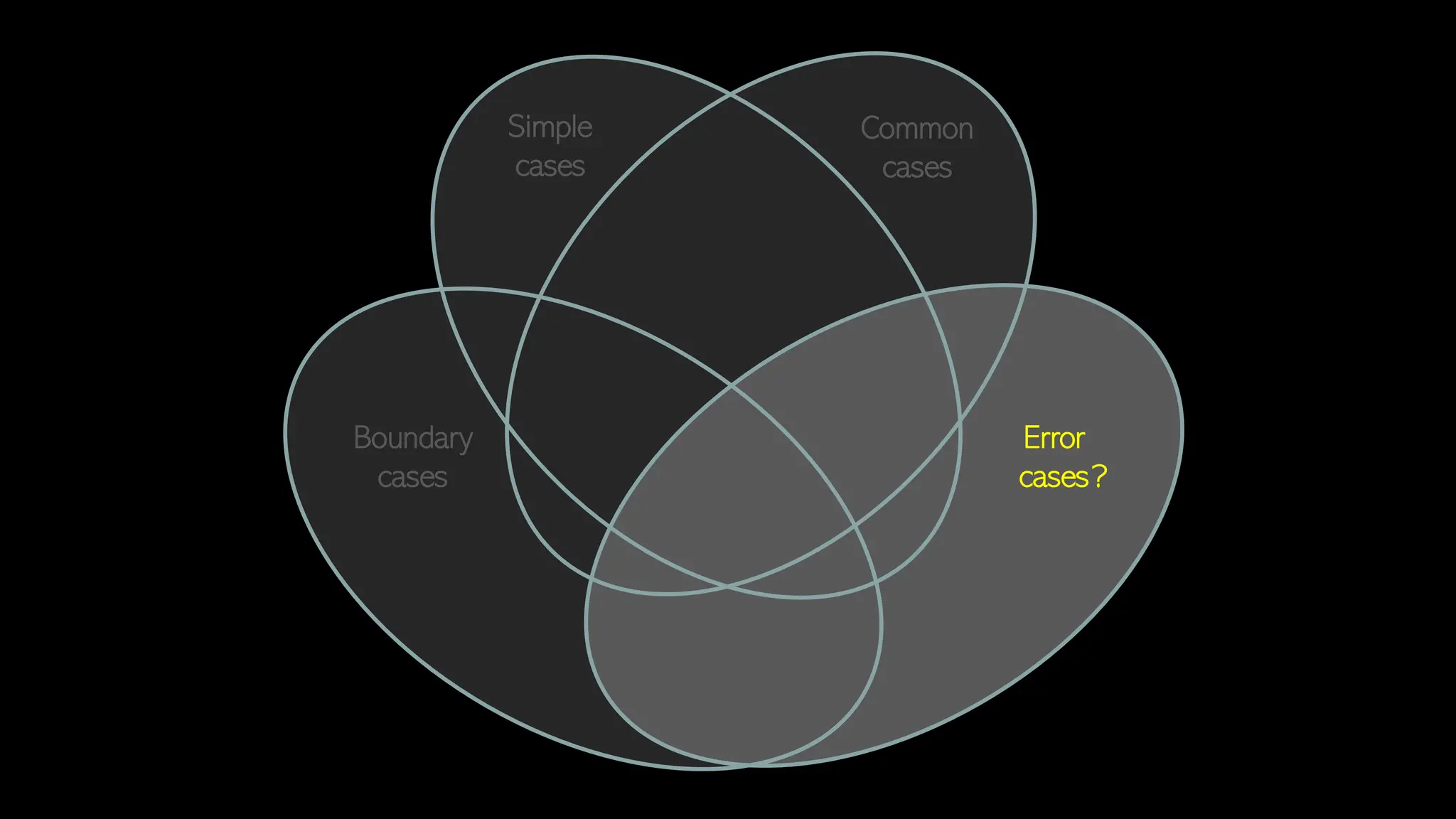
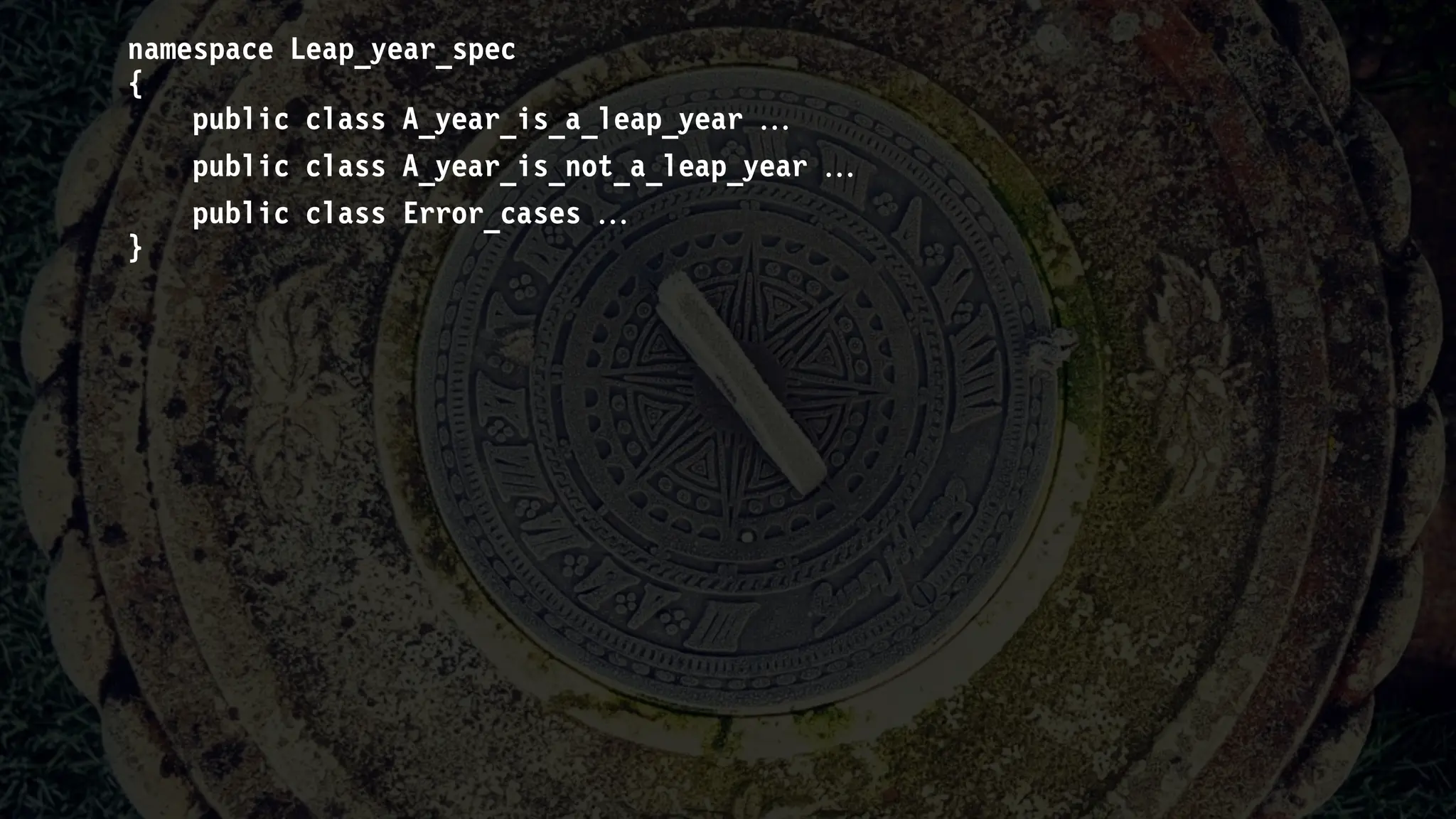
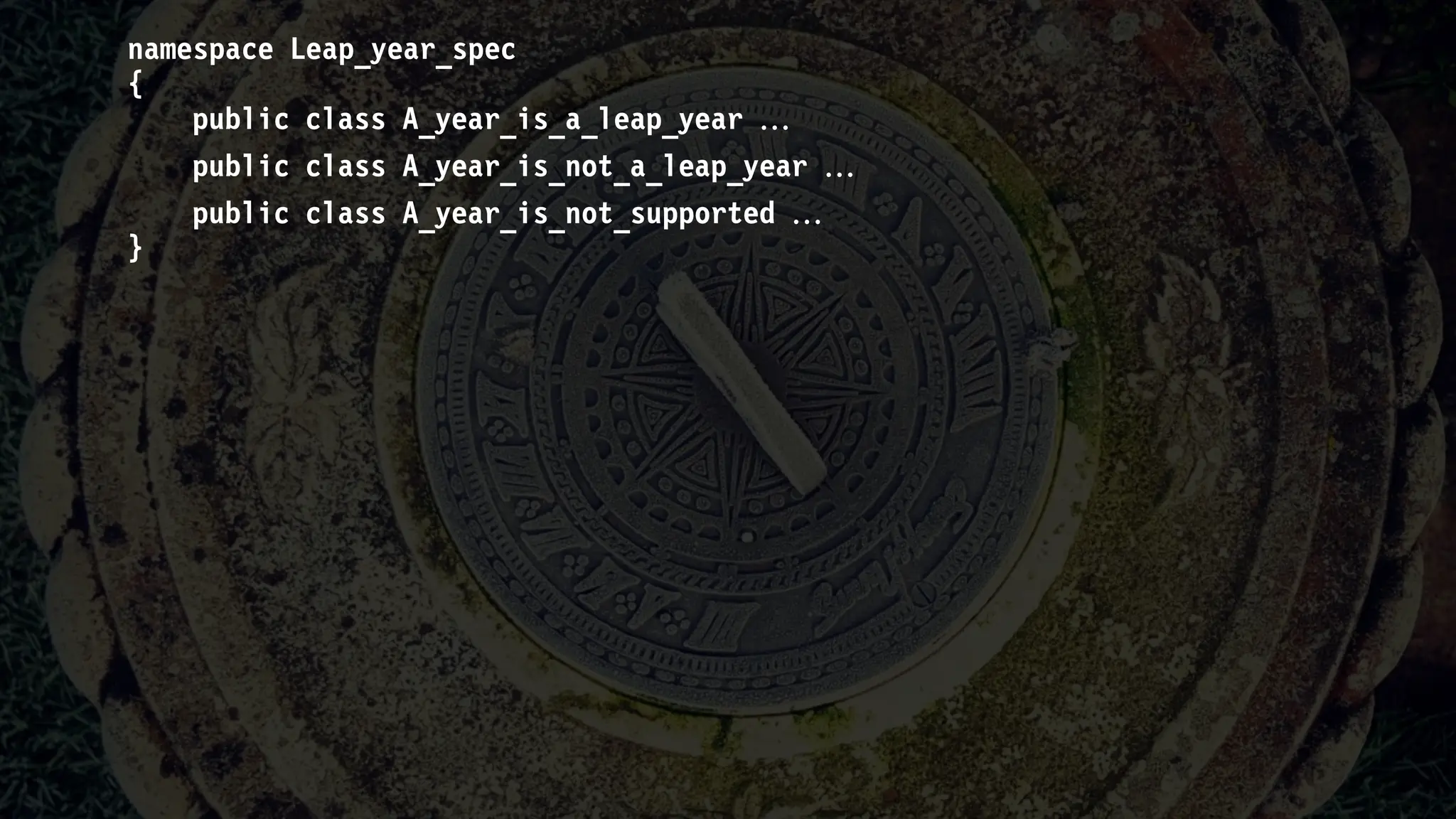
![namespace Leap_year_spec
{
public class A_year_is_a_leap_year
public class A_year_is_not_a_leap_year
public class A_year_is_not_supported
{
[Test]
public void if_it_is_0()
{
Assert.Throws<ArgumentOutOfRangeException>(() => IsLeapYear(0));
}
}
}](https://image.slidesharecdn.com/programwithguts-240326214940-3362f2d9/75/Program-with-GUTs-66-2048.jpg)
![namespace Leap_year_spec
{
public class A_year_is_a_leap_year
public class A_year_is_not_a_leap_year
public class A_year_is_not_supported
{
[Test]
public void if_it_is_0()
{
Assert.Catch<ArgumentOutOfRangeException>(() => IsLeapYear(0));
}
}
}](https://image.slidesharecdn.com/programwithguts-240326214940-3362f2d9/75/Program-with-GUTs-67-2048.jpg)
![namespace Leap_year_spec
{
public class A_year_is_a_leap_year
public class A_year_is_not_a_leap_year
public class A_year_is_not_supported
{
[Test]
public void if_it_is_0()
{
Assert.Catch<ArgumentOutOfRangeException>(() => IsLeapYear(0));
}
[Test]
public void if_it_is_negative(
[Values(-1, -4, -100, -400)] int year)
{
Assert.Catch<ArgumentOutOfRangeException>(() => IsLeapYear(year));
}
}
}](https://image.slidesharecdn.com/programwithguts-240326214940-3362f2d9/75/Program-with-GUTs-68-2048.jpg)
![namespace Leap_year_spec
{
public class A_year_is_a_leap_year
public class A_year_is_not_a_leap_year
public class A_year_is_not_supported
{
[Test]
public void if_it_is_0()
{
Assert.Catch<ArgumentOutOfRangeException>(() => IsLeapYear(0));
}
[Test]
public void if_it_is_negative(
[Values(-1, -4, -100, -400, int.MinValue)] int year)
{
Assert.Catch<ArgumentOutOfRangeException>(() => IsLeapYear(year));
}
}
}](https://image.slidesharecdn.com/programwithguts-240326214940-3362f2d9/75/Program-with-GUTs-69-2048.jpg)
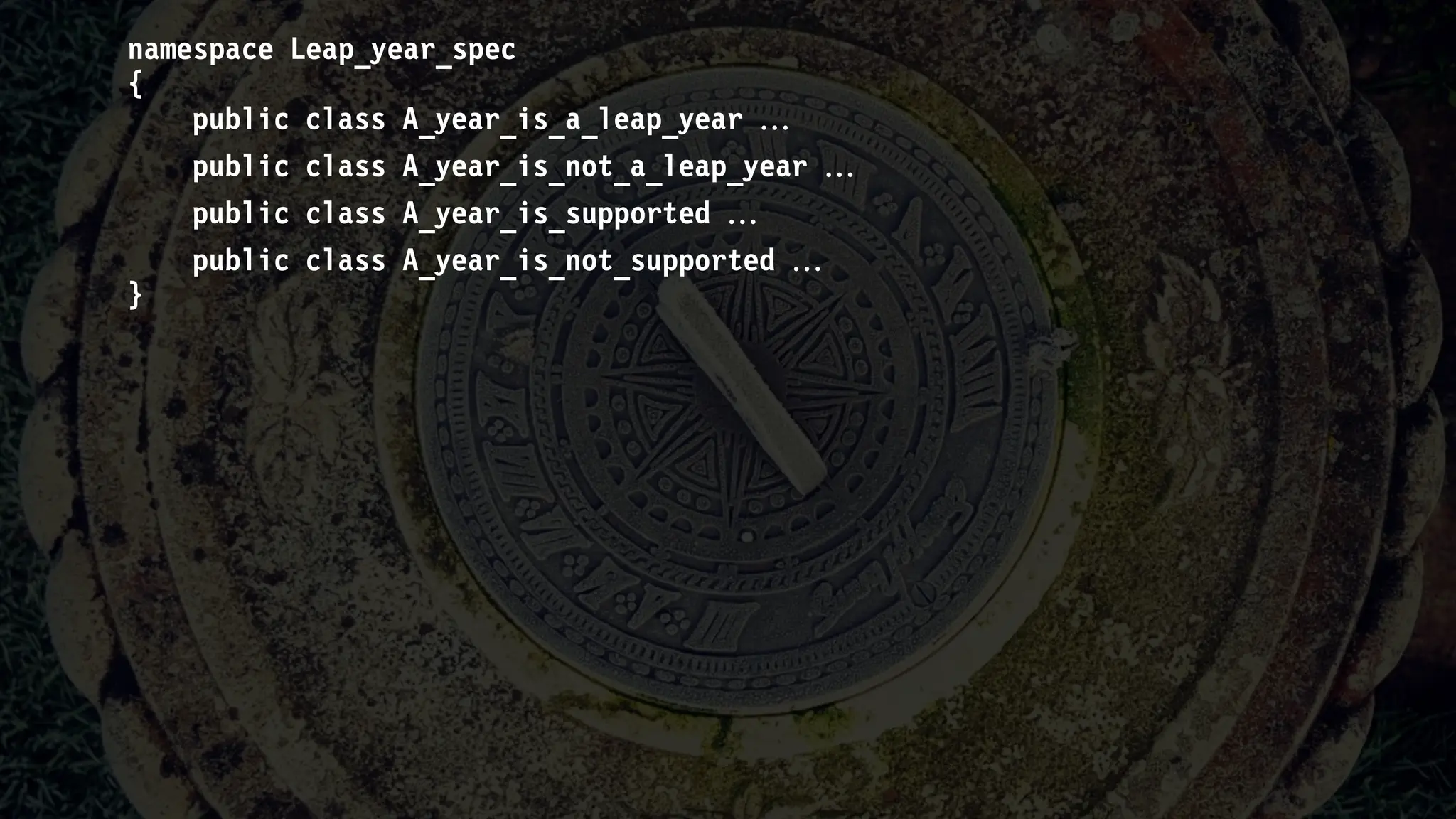
![namespace Leap_year_spec
{
public class A_year_is_a_leap_year
public class A_year_is_not_a_leap_year
public class A_year_is_supported
{
[Test]
public void if_it_is_positive(
[Values(1, 10000, int.MaxValue)] int year)
{
Assert.DoesNotThrow(() => IsLeapYear(year));
}
}
public class A_year_is_not_supported
}](https://image.slidesharecdn.com/programwithguts-240326214940-3362f2d9/75/Program-with-GUTs-71-2048.jpg)


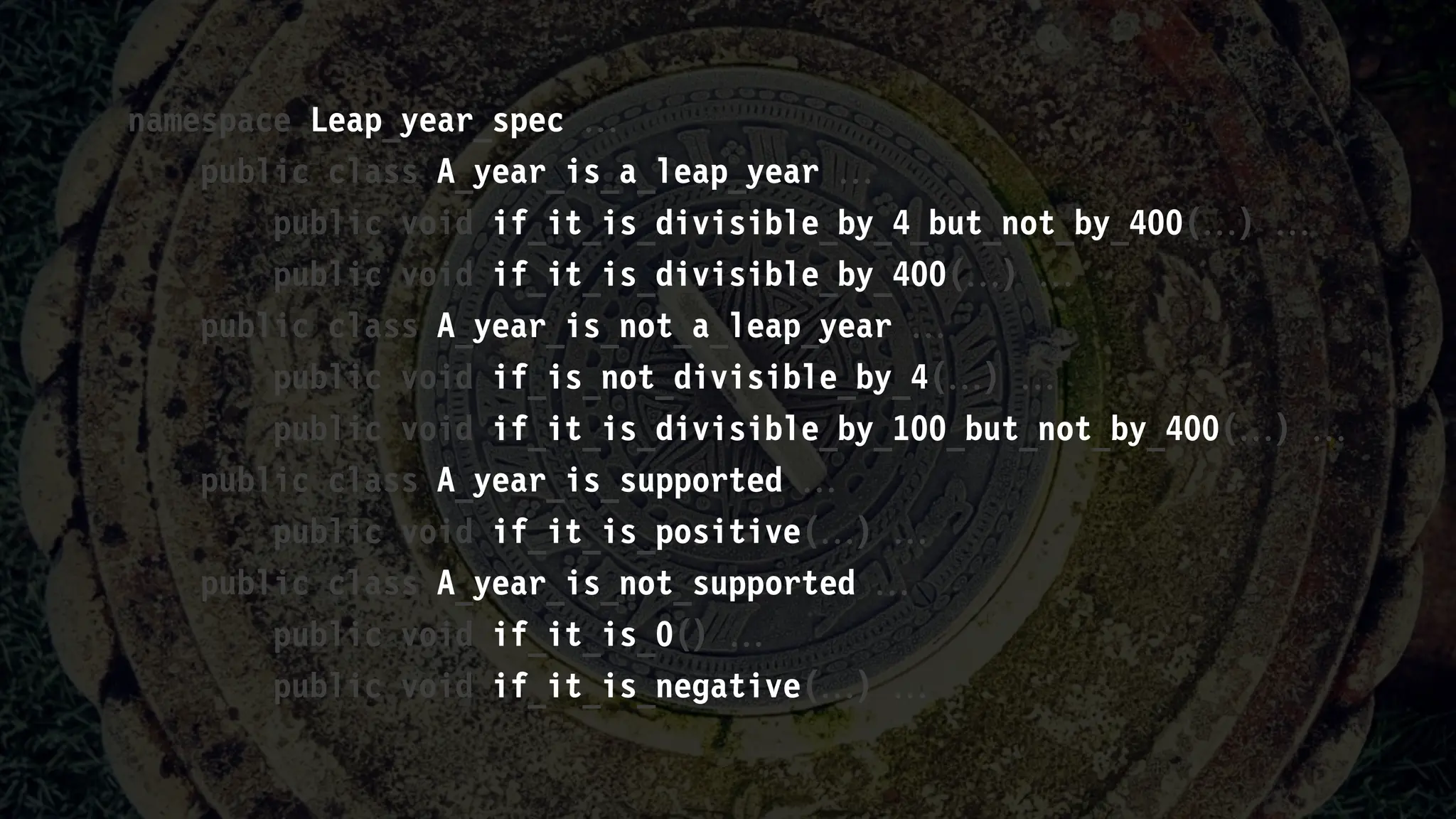


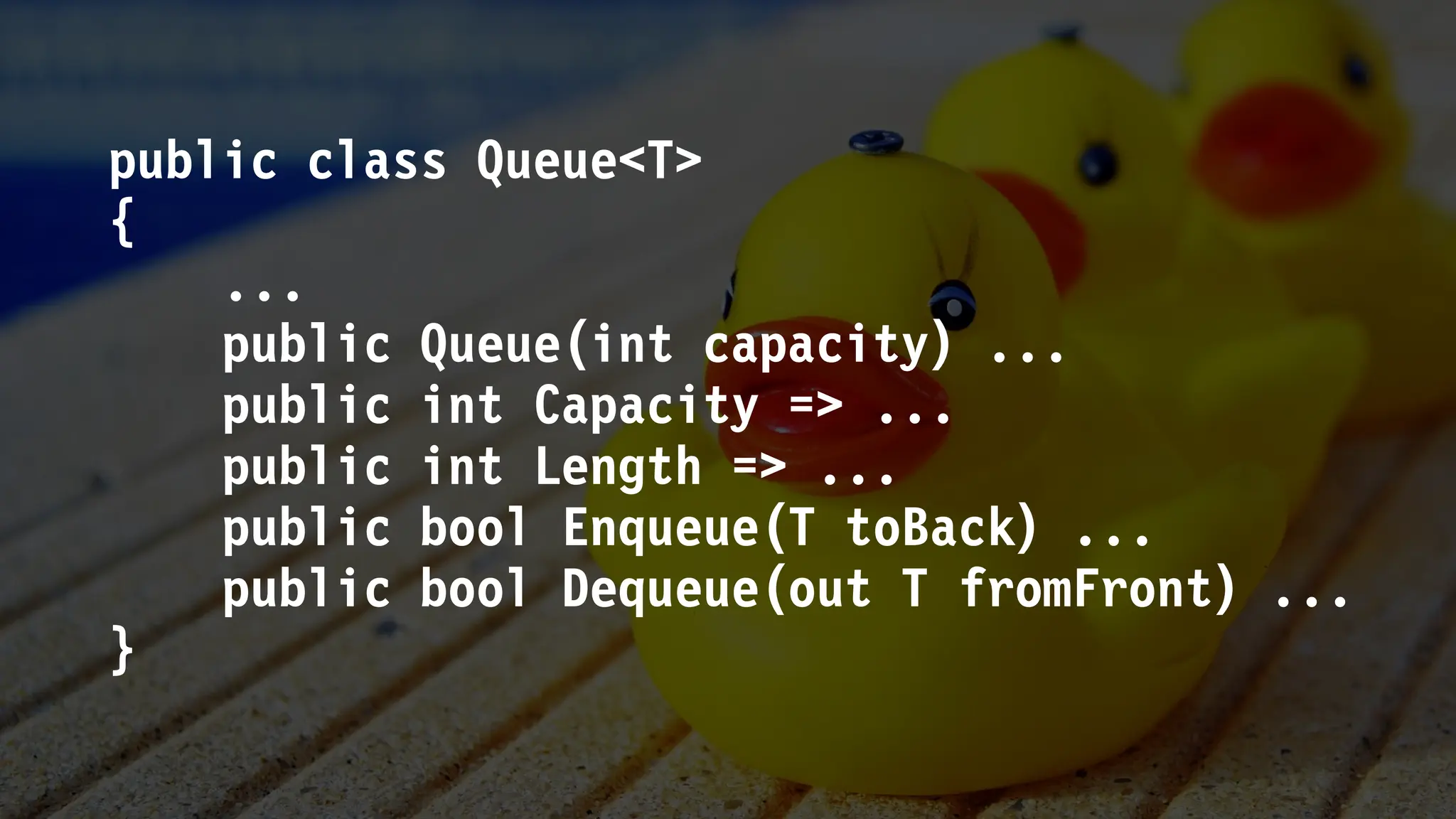

![public class QueueTests
{
[Test]
public void TestConstructor() ...
[Test]
public void TestCapacity() ...
[Test]
public void TestLength() ...
[Test]
public void TestEnqueue() ...
[Test]
public void TestDequeue() ...
}](https://image.slidesharecdn.com/programwithguts-240326214940-3362f2d9/75/Program-with-GUTs-79-2048.jpg)
![public class QueueTests
{
[Test]
public void Constructor() ...
[Test]
public void Capacity() ...
[Test]
public void Length() ...
[Test]
public void Enqueue() ...
[Test]
public void Dequeue() ...
}](https://image.slidesharecdn.com/programwithguts-240326214940-3362f2d9/75/Program-with-GUTs-80-2048.jpg)
![public class QueueTests
{
[Test]
public void CanBeConstructed() ...
[Test]
public void HasCapacity() ...
[Test]
public void HasLength() ...
[Test]
public void CanBeEnqueuedOn() ...
[Test]
public void CanBeDequeuedFrom() ...
}](https://image.slidesharecdn.com/programwithguts-240326214940-3362f2d9/75/Program-with-GUTs-81-2048.jpg)
![public class QueueTests
{
[Test]
public void CanSometimesBeConstructed() ...
[Test]
public void HasCapacity() ...
[Test]
public void HasLength() ...
[Test]
public void CanSometimesBeEnqueuedOn() ...
[Test]
public void CanSometimesBeDequeuedFrom() ...
}](https://image.slidesharecdn.com/programwithguts-240326214940-3362f2d9/75/Program-with-GUTs-82-2048.jpg)

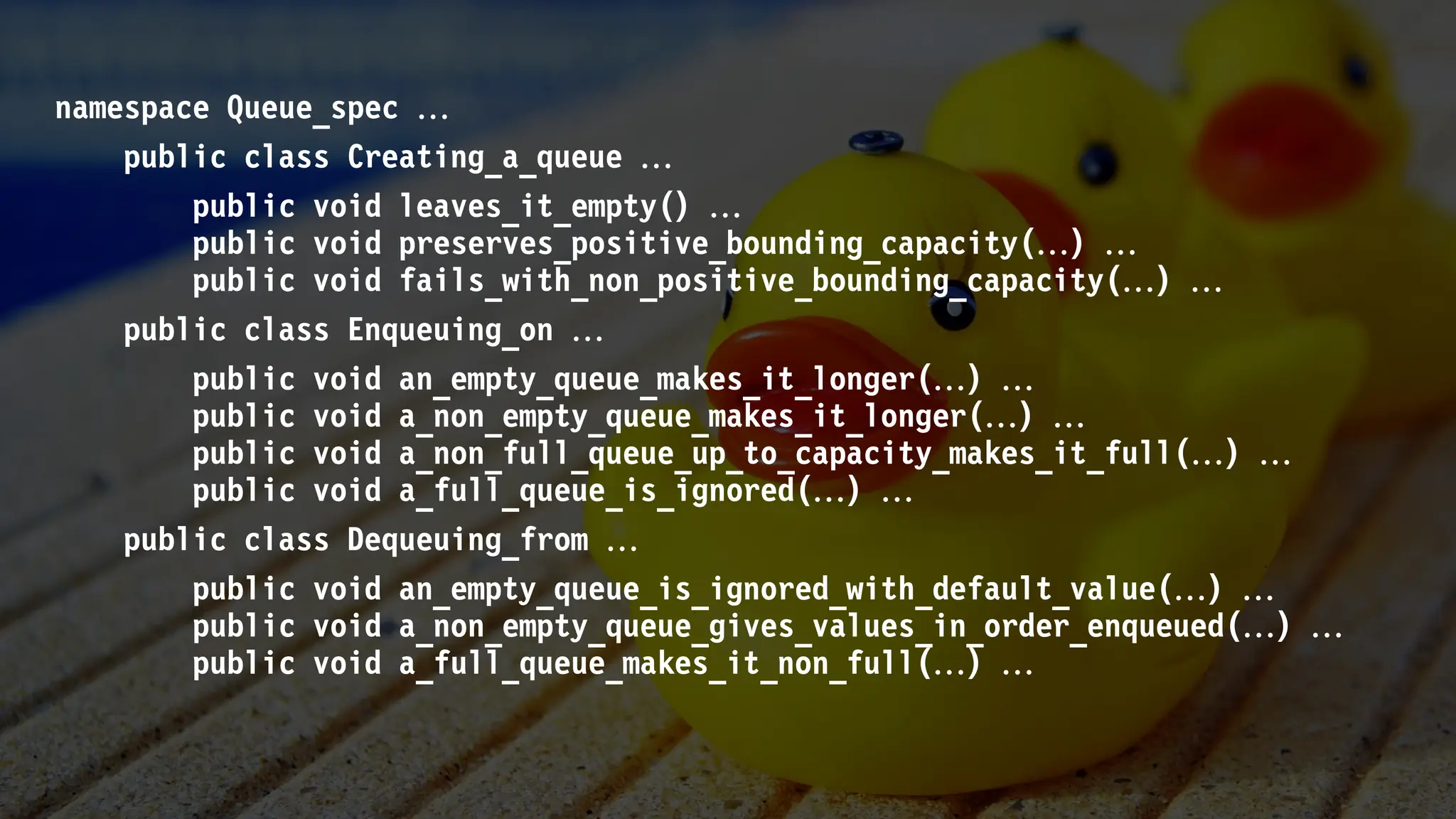

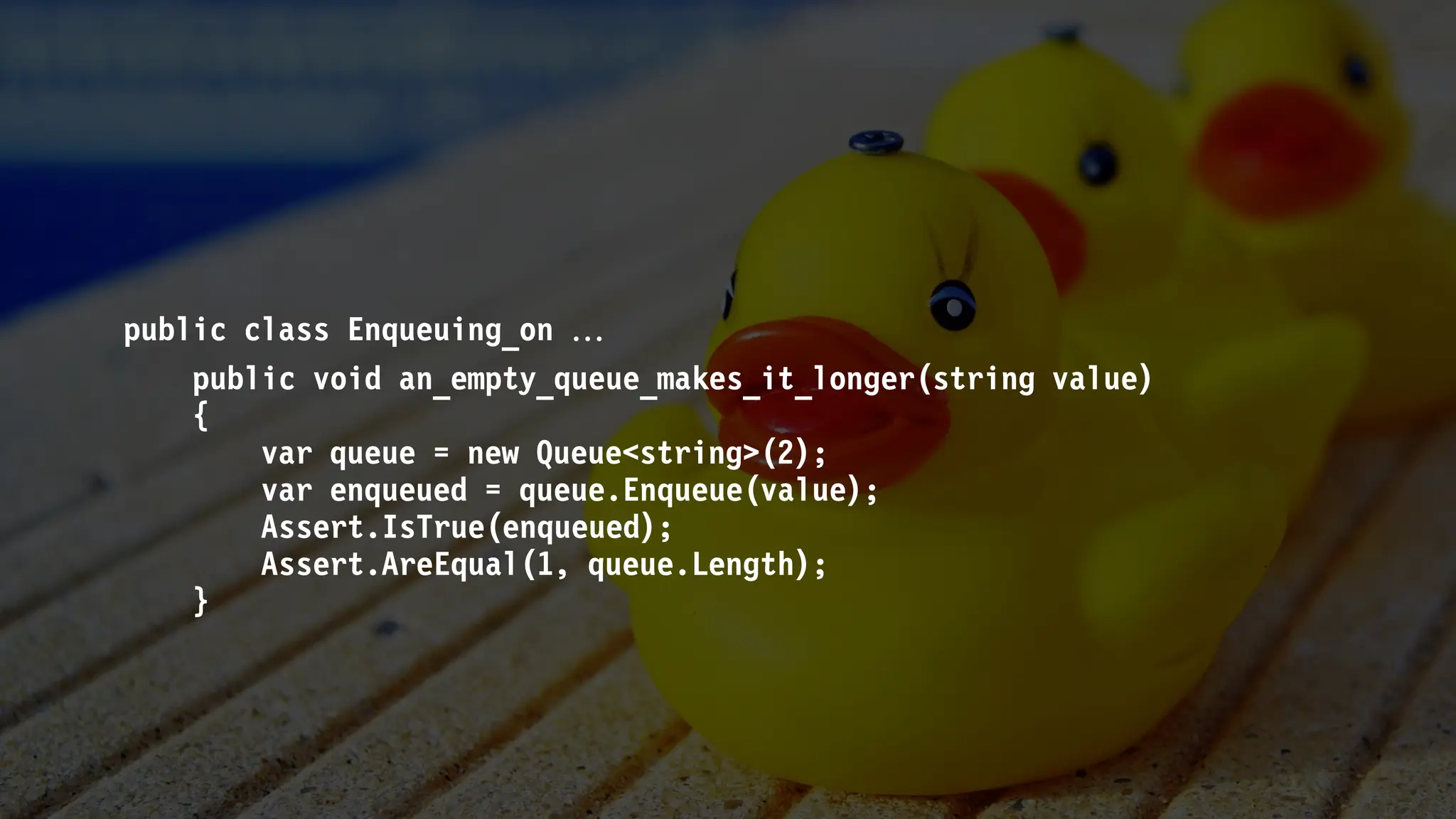
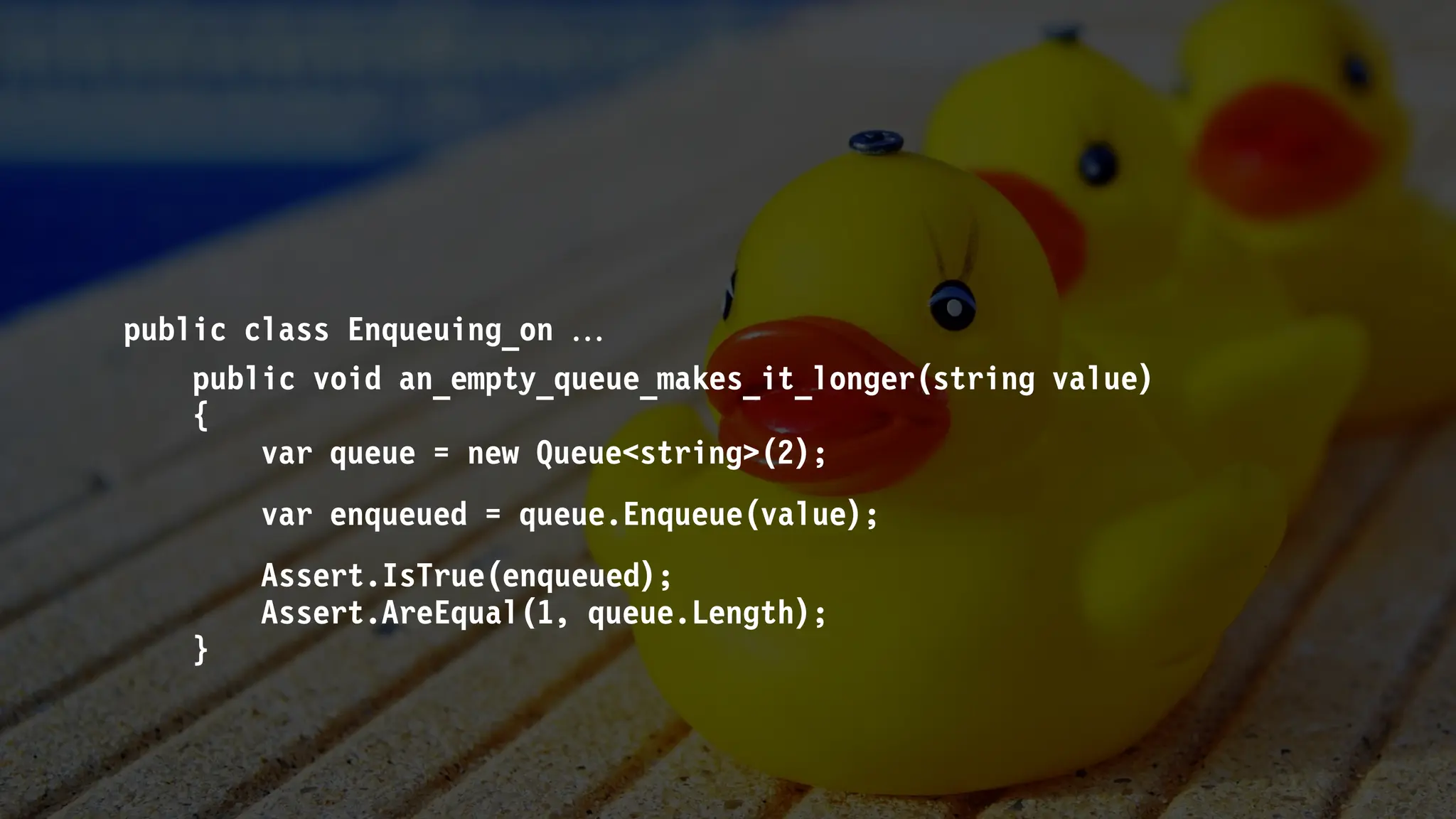
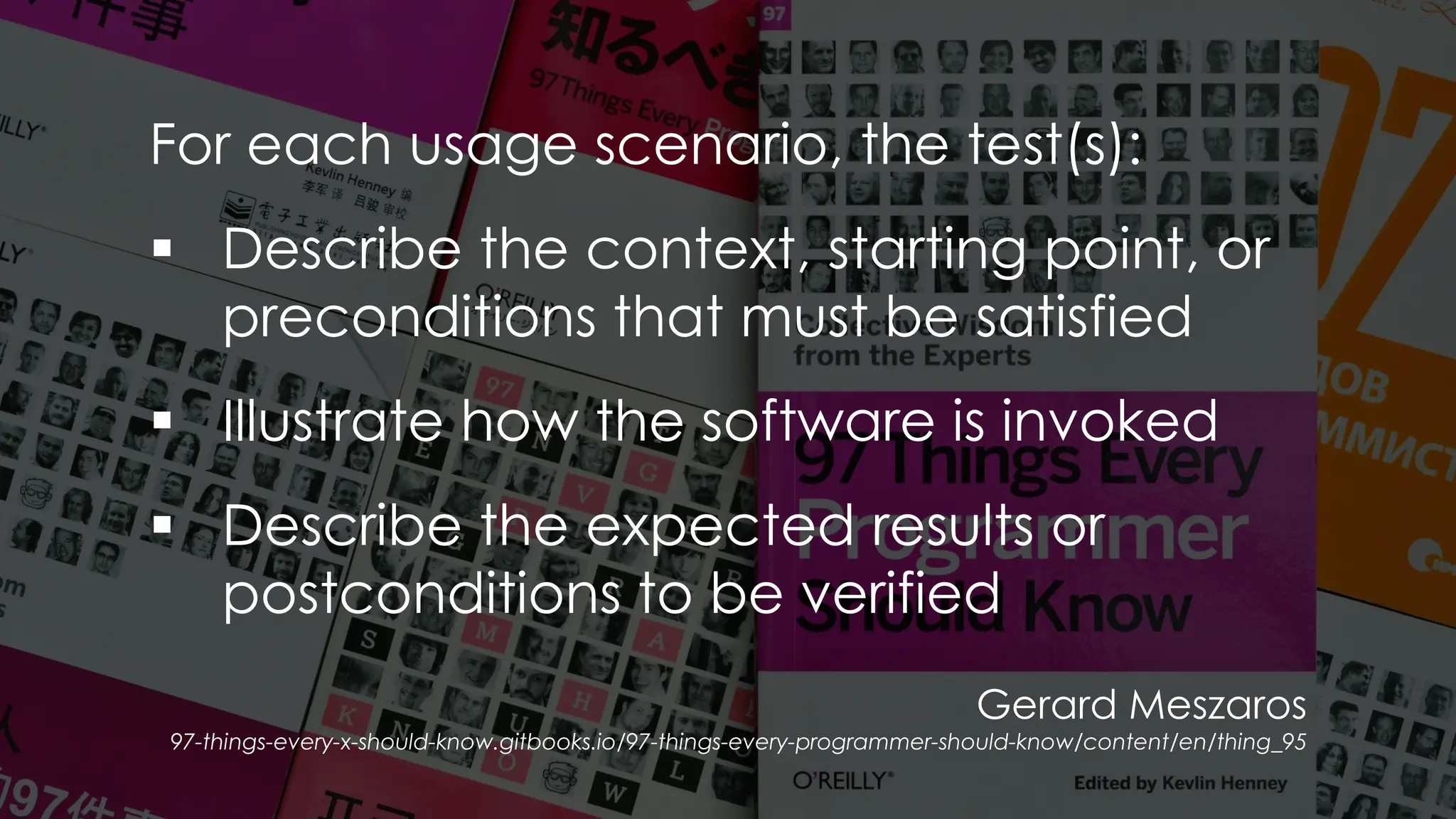
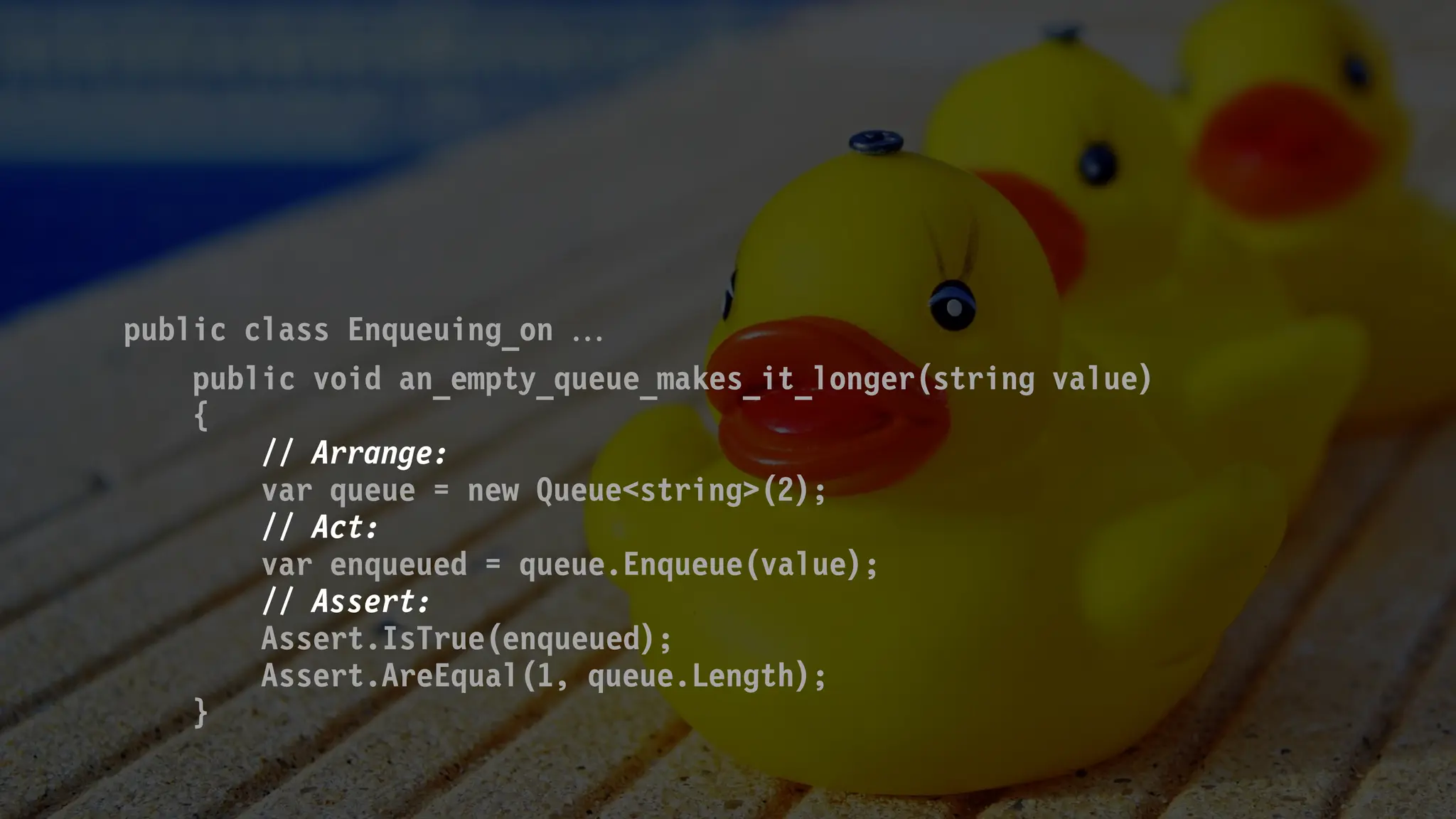
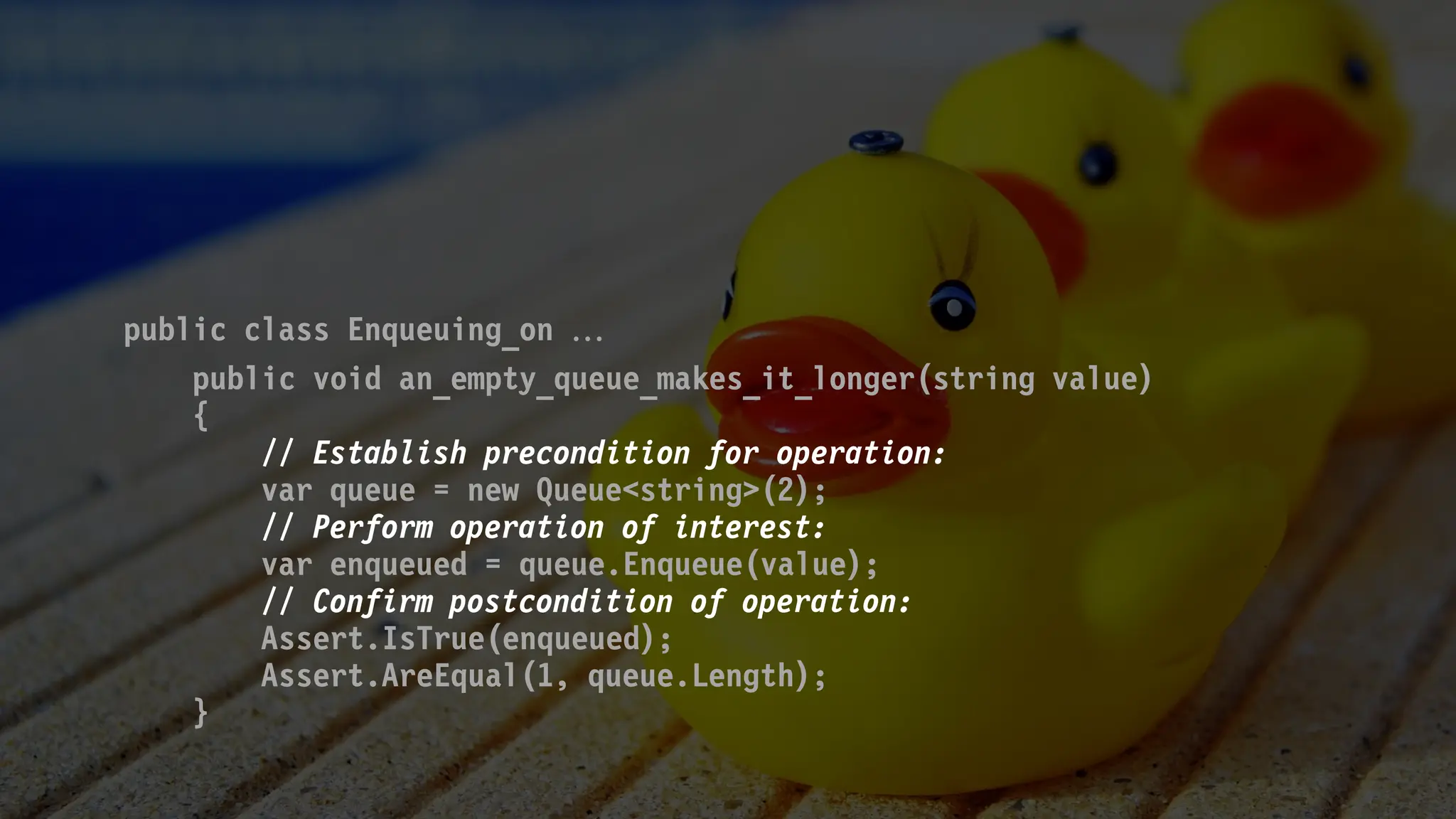
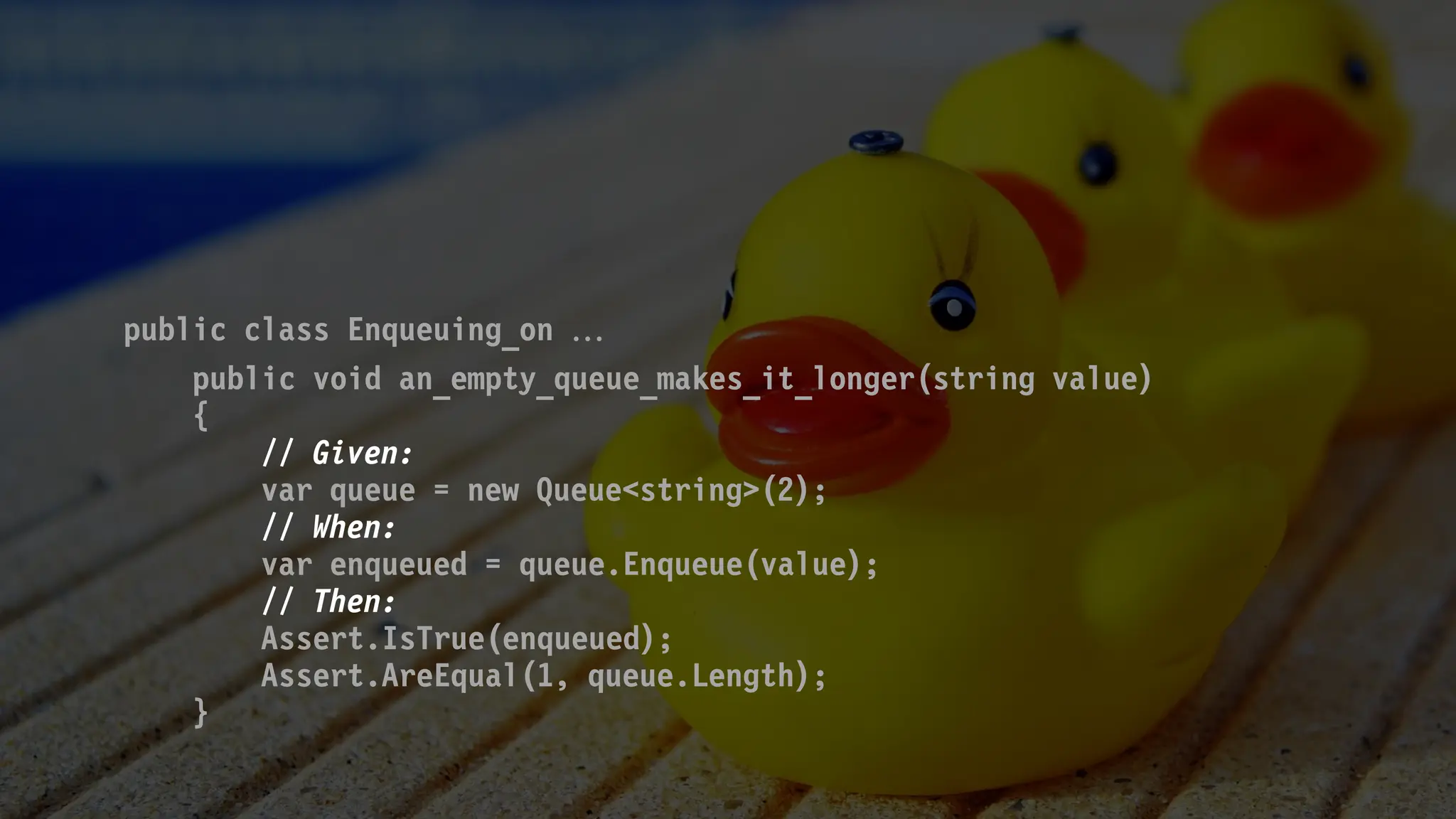

![Non-Empty
Empty
Dequeue Enqueue
Dequeue [Length > 1]
Enqueue
Dequeue [Length == 1]
new [Capacity > 0]](https://image.slidesharecdn.com/programwithguts-240326214940-3362f2d9/75/Program-with-GUTs-93-2048.jpg)
![Non-Full
Empty
Dequeue
Enqueue
Dequeue [Length > 1]
Enqueue
Dequeue [Length == 1]
new [Capacity > 0]
Full
Non-Empty
[Length = Capacity]
[Length < Capacity]](https://image.slidesharecdn.com/programwithguts-240326214940-3362f2d9/75/Program-with-GUTs-94-2048.jpg)

